


BIDDING SUPPORT
•




BIDDING SUPPORT
•
SANCB SUPPORT SERVICES
DELEGATE BOOSTING SUPPORT
PLANNING
Planning support enue and supplie recommendations
• Venue and Supplier Recommendations
Final decision with client
ORGANISER / KEY DECISION-MAKER FOCUSED
Our value proposition as an industry has been changing from one based on delegate and organiser spending to the value of what these events actually achieve for organisers, participants and host communities. As simple as it sounds, this in fact has huge implications, because it places the business-events industry at the centre of both the global economy and the underlying scientific, professional, academic, business and social advancements that drive it.
• Marketing support to promote the SA conference
• Delegate attendance promotion
ON-SITE SERVICES
• Support toward on-site elements of the event
For destination expertise and convention planning support, contact the South Africa National Convention Bureau.
T: +27 (0)11 895 3000
E: convention@southafrica.net
W: www.businessevents.southafrica.net
10 Data duty With the Information Age upon us, there is a growing need to utilise our data to understand what drives our audiences’ purchasing decisions and to inform our strategies. Meetings gets to the bottom of the matter.

12 Bridging Africa’s trade gaps With the African Continental Free Trade Agreement in the pipeline, Londi Khumalo, managing director of research consultancy Niche Partners, feels this can lead to exciting prospects for the continent’s MICE stakeholders and overall growth.
16 Elevated experiences Who could ever have imagined that everything we knew about events a year ago would change so drastically? Meetings gets to the heart of what 2021 has in store.

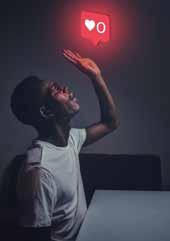
06 COVER STORY
As we move into 2021, Fancourt shares its take on delivering exceptional experiences operating under the current pandemic protocols and what we can expect from the MICE industry going forward.

Our online content strategies revolve around being seen among innumerable other items. Meetings learns what makes for compelling and engaging content that could give you the cutting edge.

18 MICEspace Covid-19 has been a game changer for the way in which we work and the tools we utilise. Meetings delves deeper to understand the developments that are shaping how the events industry makes use of social media.
24 Ts and Cs apply Pippa Naude writes on best practice when it comes to drawing up contracts during Covid-19, and aspects you should consider.


26 Making inroads Dreamcatcher South Africa took its first steps to pioneer community-based tourism in the 1990s. Founder Anthea Rossouw shares her journey.
28 More than a buzzword Kicking off at the end of October with six candidates, the Women in MICE Mentorship Programme has underscored the growing need for mentorship that makes a difference. Shanna Jacobsen highlights the key outtakes.
30 A daring demonstration The end of November saw Specialised Exhibitions collaborate with a number of notable industry players to bring us the Restart Expo. As an official media partner, Meetings was part of the action.
34 Putting it on the backburner With borders slowly opening up to receive international arrivals, Meetings investigates just some of what can be expected when landing on foreign soil.
The Planner is growing its footprint – connect with us today!
Managing Editor Shanna Jacobsen (shanna@3smedia.co.za)
Digital Editor Pippa Naudé
Chief Sub-Editor Tristan Snijders
Head of Design Beren Bauermeister
Contributors Sven Bossu, Glenton de Kock, Michelle Hinrichsen, Londi Khumalo, Greg McManus, Ellen Oosthuizen, Devi Paulsen
Production & Client Liaison Manager

Antois-Leigh Nepgen
Group Sales Manager Chilomia Van Wijk

Bookkeeper Tonya Hebenton
Distribution Manager Nomsa Masina
Distribution Coordinator Asha Pursotham
Advertising Vanessa De Waal +27 (0)84 805 6752 | Vanessa.DeWaal@3smedia.co.za
PUBLISHED BY
Publisher Jacques Breytenbach
During 2020, we have had to get comfortable with the only constant being change. We have dug deep to ensure our offerings are positioned to deliver exceptional value to our clients, and we have come together in a way that we haven’t before. From this collaborative drive, we have seen the birth of the South Africa Events Council (SAEC) – a body that is comprised of 14 industry associations and speaks with one voice by encompassing collective challenges and objectives. SAEC was also a key participant at the Restart Expo held at the end of November, which hosted many of the exhibition industry’s key role-players and suppliers. You can read about this fantastic showcase on page 30.
During the course of the year, and in particular during the pandemic, we have seen how important data is in ensuring we are informed of the latest developments in the current, rapidly shifting landscape. This highlights the need for us to take stock of our own contribution towards this, which we see in our data (page 10) and research features (page 12). I would also like to urge our readers to take the AfricanPerspectives ontheMICEIndustry survey and get in touch with us to help drive this within your network.
Typically, in each November/December edition of the magazine, we explore some of the trends we can look forward to in our industry during the
upcoming year. This issue of the magazine is no different, and one of the most interesting insights we are seeing is how we connect with our audiences. Read this notto-be-missed article on page 16, together with our social media feature on page 18, to understand how best to engage with your audiences.
As a facilitator of the Women in MICE Mentorship Programme, I have had the personal pleasure and privilege of connecting with each of our phenomenal candidates who have come together to grow their skills in being able to deliver mentorship meaningfully and support each other on this journey. On page 28, we share their take on what it means to be a mentor and leader, and why this is more relevant than ever.
Before we wrap up for the year and all have a well-deserved break during the holidays, I would like to take a moment to thank our readers for their support in 2020 – we could not have done what we do without you! We have endured significant hardship during this year that has seen many lose beloved family members and friends, and a lack of revenue has compromised the wellbeing of countless others.
In 2021, may we continue to stand strong and brave in the face of adversity. Let’s celebrate one another’s as well as our collective achievements and, when the chips are down, let’s do what we can to extend our support where it is needed. Wishing you a safe and blessed holiday period. I look forward to seeing you all in 2021!
3S Media
46 Milkyway Avenue, Frankenwald, 2090 PO Box 92026, Norwood 2117
Tel: +27 (0)11 233 2600 Fax: +27 (0)11 234 7274/5 www.3smedia.co.za
Meetings NOVEMBER/DECEMBER 2020 © Copyright

All rights reserved 2020 www.theplanner.guru
SUBSCRIPTION
R330.00 per annum (incl. VAT) | subs@3smedia.co.za
ISSN 1684-9264
Printers Novus Print Montague Gardens
NOTICE OF RIGHTS Meetings is published bi-monthly by 3S Media. This publication, its form and contents vest in 3S Media. All rights reserved. No part of this book, including cover and interior designs, may be reproduced or transmitted in any form or by any means, electronic or mechanical, including photocopying, recording or by any information storage and retrieval system, without permission in writing from the publisher, nor be otherwise circulated in any form of binding or cover other than that in which it is published and without a similar condition being imposed on the subsequent purchaser. The authors' views may not necessarily reflect those of the publisher or associated professional bodies. While every precaution has been taken in the preparation and compilation of this publication, the publisher assumes no responsibility for errors, omissions, completeness or accuracy of its contents, or for damages resulting from the use of the information contained herein. While every effort has been taken to ensure that no copyright or copyright issues is/are infringed, 3S Media, its directors, publisher, officers and employees cannot be held responsible and consequently disclaim any liability for any loss, liability damage, direct or consequential of whatsoever nature and howsoever arising.
Despite the challenges of this year, I am inspired and encouraged by the phenomenal achievements and strides the business events industry has made to ensure its survival.
Kenya’s Tourism Research Institute has reported growth within the country’s domestic market, with Tanzania overtaking both the US and Uganda to become its leading tourist source market in September. Kenya’s travel market appears to be picking up to previous levels after seeing an 85% increase in international arrivals month-on-month, with nearly 45% of travellers coming to the country for business or a form of MICE-related activity.



Accor Hotels continues to grow its footprint in Africa and has announced the debut of three brands across three new properties in Djibouti. The Pullman Living, Novotel and MGallery hotels will be managed by Kamaj Investments and add to Djibouti’s accommodation offerings, with the country located at the centre of one of the world’s key shipping routes that link Europe, the Far East, the Horn of Africa and the Persian Gulf.

Insurance Claims Africa has welcomed the Western Cape High Court’s judgment in favour of Ma-Afrika Hotels and Stellenbosch Kitchen against Santam, calling the ruling a resounding victory for all tourism and hospitality businesses. In addition to paying Ma-Afrika’s legal costs, Santam has been ordered to pay Ma-Afrika for the impact over the entire policy period of 18 months without limitations.

On 24 October 2020, the Soweto Chapter (Sobec) of the Township Events Business Council SA became the 14th member of the South African Events Council (SAEC).
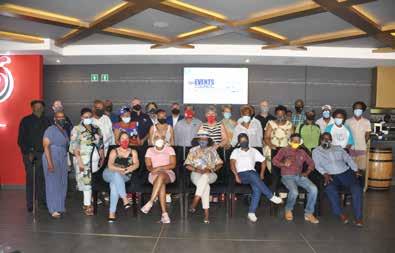
The SAEC is comprised of more than 2 000 companies and over 50 000 professionals across the events sector. It provides a platform for engagement with various government departments and related industry bodies.
President Cyril Ramaphosa officially unveiled the R950 million Radisson Hotel & Convention Centre, Johannesburg, O.R. Tambo, which opened its doors for business on 2 November 2020.
The opening of the 248-room Radisson Hotel marks the debut of the Radisson Hotel Group’s fourth brand in South Africa. It also forms part of the City of Ekurhuleni’s 30-year ‘aerotropolis’ master plan.
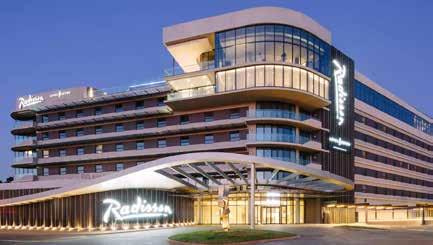
Ezemvelo KZN Wildlife’s world famous Amphitheatre, a mighty basalt cliff face in the shape of a semi-circle, is one of the most impressive parts of the Drakensberg in the north western corner of KwaZuluNatal. Often described as a rock wall, the Amphitheatre is about 500 meters in height and stretches out for roughly 5 kilometres between the Sentinel and the Eastern Buttress and the Tugela Falls. Visitors from all over the world are drawn to this dramatic part of the Drakensberg to enjoy walks and hikes in mountain splendour.

Ezemvelo KZN Wildlife’s Thendele Resort in Royal Natal o ers a view of the Amphitheatre from every chalet and is one of the closest of the Ezemvelo’s resorts to the main Drakensberg escarpment.
Thendele attracts visitors from all over the world and its range of accommodation options suits all pockets. There are 26 self-contained chalets that accommodate either two or four people each, two 6-bed cottages and a well-appointed lodge with 3 en-suite bedrooms situated well away from the main resort. The lodge has a resident cook who will prepare meals from the provisions brought by visitors.
Royal Natal has two camping grounds with 120 campsites with ablution facilities, hot baths and showers and barbecue facilities. Horse riding is available nearby as is trout shing.
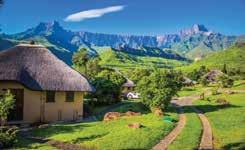 World Heritage Site
World Heritage Site
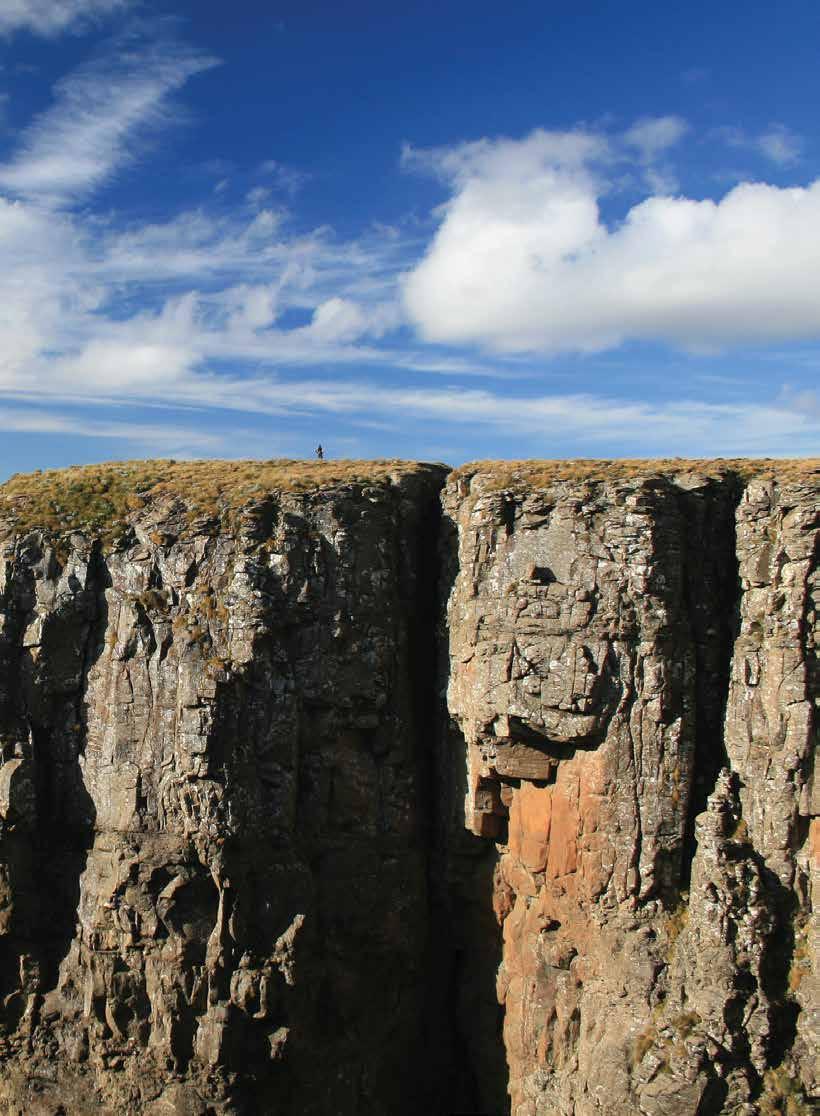

Anyone involved in travel, tourism, hospitality and MICE (meetings, incentives, conferences and exhibitions) understands that the industry is going through challenging – and changeable – times.
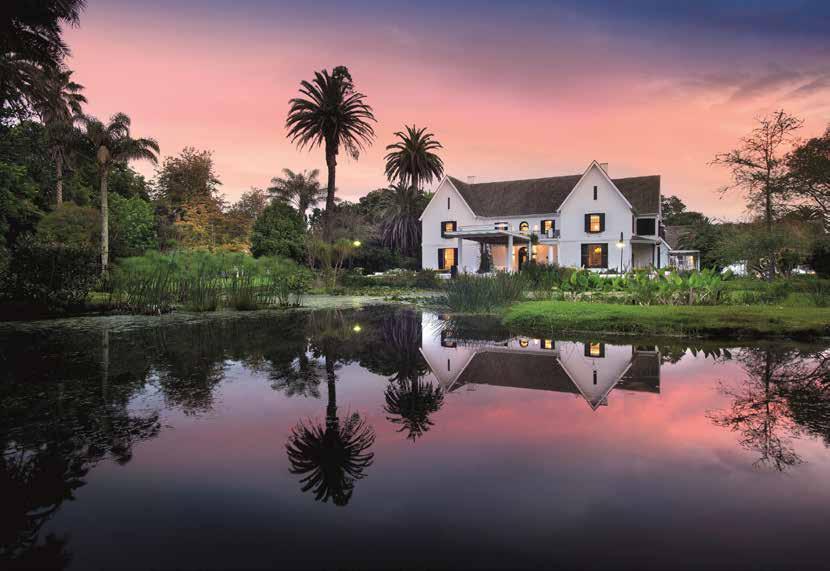

Not only do the business travel and MICE sectors have to adapt to new demands imposed by the Covid-19 pandemic but the global workforce is undergoing a transition all of its own.
The biggest public health priorities at the moment are around ensuring people continue to adhere to good personal and community hygiene practices and to the correct and consistent use of masks –not to mention the need to avoid ‘super-spreader’ events at all costs.
From sanitising your hands before entering an establishment to filling in a wellness questionnaire to declare any symptoms that you may be experiencing, these Covid-related changes are significant, and the reality is that they are here to stay.
But perhaps the biggest change relating to MICE travel in 2020 is the need to consider smaller gatherings. According to Level 1 guidelines, events are currently limited to 250 persons or fewer in an indoor gathering, and a maximum of 500 persons at an outdoor gathering – provided that no more
As we move into 2021, Fancourt shares its take on delivering exceptional experiences operating under the current pandemic protocols and what we can expect from the MICE industry going forward.
than 50% of the capacity of the venue is used and strict social distancing measures are observed. This is why so many businesses and employees are selecting MICE venues and accommodation that allow for outdoor corporate gatherings, and why space, fresh air and beautiful surroundings have become even more essential and in demand than ever before.
For Peter Dros, sales and marketing director of Fancourt, this is critical: “The days of spending eight hours indoors at a conference or event are over. Organisers are actively looking for venues that offer an indoor/outdoor flow, flexible configurations that can deliver social distancing with ease, and spacious grounds for al fresco events.”
According to statistics, Millennials are estimated to make up around half of the global workforce and,
stay at eco-friendly establishments and do their part by contributing to sustainable tourism, for example, by spending an hour or two volunteering for a good cause. In short, they want to support local and give back.
• Tech savvy: Most Millennials and all of Gen Z have grown up with technology already heavily integrated into their lives – so they expect the same when it comes to travel. They use their smart devices to book and check in for flights, to take virtual tours of potential MICE venues, and to cut costs as they go.
Although a return to normal leisure travel still seems a long way off, travel experts, travel managers and MICE organisers understand the importance of combining business with leisure (hence, bleisure). A few days off at the beginning or end of a trip can make a world of difference to a traveller’s health, mental well-being and morale. Bleisure trips have seen a steady rise in popularity over the last few years, and 2021 will be no different.
In fact, says Peter, they may become more important than ever.
Discover SA’s business playground from R2 020 per person sharing or R2 640 per single. Rates are per night and based on a minimum two-night stay, including a full English breakfast daily and one of the following:

• full-day conference package
• a round of golf per day on either the Montagu or Outeniqua courses
• a spa voucher to the value of R590

• a dinner voucher to the value of R345.
Alternatively, consider Fancourt’s Executive Escape and discover the magic of the Manor House by booking out South Africa’s leading boutique hotel for you and your team.

For more information, contact reservations@fancourt.co.za.
in 2020, Generation Z also makes up an impressive 24%. In other words, the workforce has undergone a drastic shift over the course of the last decade, as have the expectations and demands of the average employee and business traveller. So, what sets Millennials and Gen Z apart from Generation X and the Baby Boomers?
• A greater emphasis on experience: Gen Z and Millennials, also commonly referred to as the ‘now generation’, expect more from a business trip than a few meetings or breakaway sessions – no matter how insightful or valuable. They want to soak up the many perks and wonders of the destination, too. In-between networking and making important business decisions, they want to explore, experience something new and enjoy local life.
• Greener travel: The next most crucial thing for the now generation is corporate travel that puts the environment first. They want to
“Travellers are now looking to make their business trips count. Whether it’s as a result of a pent-up demand for post-lockdown travel, or wanting to extend one’s stay to balance out the stress and admin surrounding new travel regulations, guests are looking to stay longer – and enjoy everything their destination has to offer.”
When booking a conference or event, consider the venue’s leisure options too. The idea of health and well-being is now front and centre, and an extra ‘down’ day is very appealing to those who want to relax – or are ready to get out and explore.
“We are extremely lucky at Fancourt. We are able to offer everything from a round of golf to a spa day, nature trails and bike paths, beach braais, wine tastings and more. In terms of bleisure, Fancourt ticks all the boxes,” says Peter.
The changes brought about as a result of Covid-19, paired with today’s evolving workforce, mean that MICE travel is undergoing a complete makeover, and MICE experts, businesses and corporate travel suppliers need to adapt accordingly.
Platforms such as Zoom and Microsoft Teams have proved that even large meetings can happen online. Going forward, each and every MICE

event will be scrutinised through a new lens. Is it necessary? Will it add value? Can it adhere to the necessary health and safety measures? Does it offer more in terms of authentic, memorable experiences – and is there a way to build in a leisure component? There is no doubt that MICE events will return after Covid-19 – they may just look a little different.
Fancourt is nestled in the shadow of the spectacular Outeniqua Mountains. The surrounding 613 hectares of lush countryside make for stunning views and plenty of opportunities for outdoor pursuits. It’s not called the business playground of South Africa for nothing!
Following a meeting or conference, corporate travellers can explore the estate or chat to their team to organise an afternoon of wine tasting at one of the local vineyards. Other ‘experiential’ ideas to consider for adventurous delegates include a big five game drive, an unforgettable beach braai, boat cruises along the Knysna Lagoon and, of course, a challenging round of golf at some of South Africa’s top golf courses: The Links, Montagu and Outeniqua.
Powerboat adrenaline experience in Garden Route and Klein Karoo
Take a safe but enjoyable, high-speed boat trip through the famous Knysna Heads, exploring the caves and special spots outside the Heads, before doing a high speed, an exhilarating trip through the Knysna Estuarine.
Traditional cooking experience in Cape Town
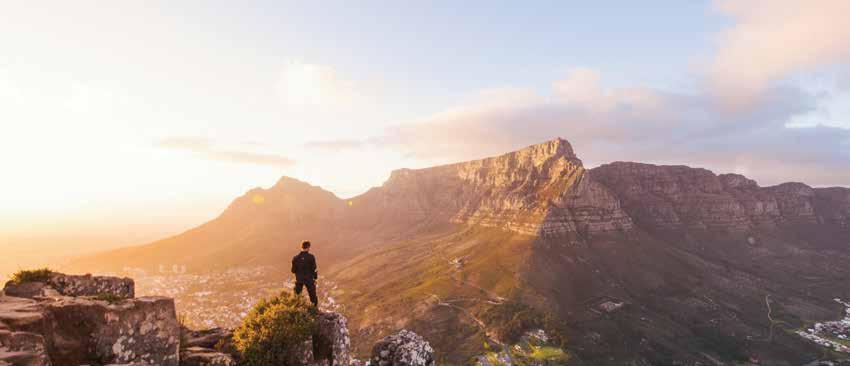
The Bo-Kaap, perched on the slopes of Signal Hill, is home to a large Cape Malay community. The area is filled with the spicy scents that waft downhill from the colourful homes and cobbled streets. A walk through the historic Malay quarter of Cape Town takes guests through its legends and secrets and introduces visitors to the wonderful aromas and distinctive cuisine of the Cape Malay community.



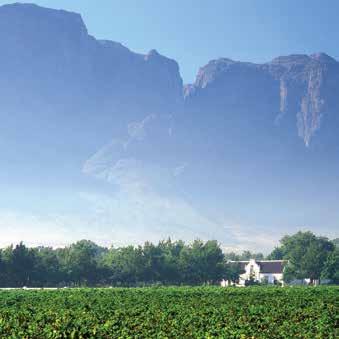
Over the past two decades, we have seen a massive increase in our capacity to access, produce, store and reference enormous amounts of data. Figures from Statista show that market revenue for data hosting, storage, and cloud computing services, just on its own, is projected to reach US$163 billion (R2.5 trillion) by 2021.
Even more valuable than this is being able to, from the data we have available, garner insights into understanding our stakeholders’ purchasing decisions and better informing our business strategies.
“To thrive in this new age, every organisation needs a complete view of its data – real-time insight, with the ability to take real-time action,” says a report from Splunk, a US multinational and listed data solutions company.

The report notes that 81% of 2 259 surveyed participants believe data is crucial to the success of their operation. And nowhere could data be more relevant than where we find ourselves now.
On the back of the Covid-19 pandemic and a strained economy, where many industries are working twice as hard for half the money – if they’re lucky – purchasing decisions are being made with several considerations in mind. Revenue streams that were once flowing strongly have dried up, which has naturally led to decision-makers and those with purchasing
power to reconsider their budgets and trim costs down to the bare minimum to ensure business survival.
This is where understanding the power of our data comes in handy.

Among the massive advantages of operating in the Information Age are the analytics behind it. This exists in its own complex ecosystem and it is closely interlinked with technological advances such as hardware, software and, of course, connectivity – the glue that provides access, archiving and navigation in real time.
Suddenly, we can compile audience demographics and establish how long they have interacted with our brand’s campaign and on what device. The higher our views and click-throughs, the more relevant we know our campaign is to our existing audience. A/B split testing enables us to test the waters, constantly tweaking and optimising what works best for which audiences. These insights are key to drilling down to the subtle nuances that either draw in or stifle potential growth opportunities.
Interestingly, we are just on the cusp of understanding how to harness and utilise our data, and two-thirds of companies from the Splunk report say they are “in the dark” when it comes to how to use their own information,
With the Information Age upon us, there is a growing need to utilise our data to understand what drives our audiences’ purchasing decisions and to inform our strategies. Meetings gets to the bottom of the matter.
Data is a precious thing and will last longer than the systems themselves.”
Tim Berners-Lee, inventor of the World Wide Web
with this being “untapped, unknown, unused”. Meanwhile, nearly half of these businesses worry that they will fall behind their competitors with the rapid growth of data, highlighting this as a growing area of concern.
An important aspect of data to understand is that it is in a constant state of flux, particularly if we are factoring in the human element, which is, in itself, variable. More importantly, as we understand these variable changes, we can refine our strategy to ensure we are top of mind for our existing and potential markets.
Barring word-of-mouth recommendations and reviews, decision-makers’ purchasing decisions are often based on sentiment. This is contingent on a range of intricacies that are entrenched in psychology, and encompasses everything from design to how the weather is currently affecting individual moods.

We can see how rapidly this shift can occur with the current pandemic, which has affected determining factors such as perceptions and values that would typically lead to the purchase of services or products. Businesses and consumers are no longer spending in the same way they did nearly a year ago because their priorities have had to align with the new landscape.
Despite what has been a near-crippling effect for many, the world didn’t stop turning. While it is business unusual, life has and is carrying on, and those who are seeing the most success during this time have their offerings established in such a way that they can connect with their customers and deliver relevant services using the most agile means possible. In the context of where we are currently, this has translated to successfully leveraging digital to stay ahead of the curve.
Tapping into our data means utilising this in a way that supports our business objectives. On the flip side of this coin, this needs to be of interest and relevance to our stakeholders, which extend to our audiences and clients. Unfortunately, this isn’t and shouldn’t be a one-size-fits-all solution because data, in a business sense, by its very nature, is specific to a brand and its end-users. The silver lining within this is that our unique solution is rooted in this challenge, with the next step here being personalisation – the pinnacle of our efforts. We already know from our own habits that attention spans are fleeting. We have mere microseconds to make an impression and generate interest in our campaign. Additionally, if it doesn’t connect with our audiences meaningfully in a way that they immediately take notice of, its purpose is lost.
Start at the end. Identify your objectives and take stock of what you already know but consider what you still might want to understand before you shop around for the right solution.
There are numerous tools available online, with Google Analytics being among the most popular; however, if you are out of your depth, a host of local and global consultancies and companies provide data and analytics services. But – like your niche data solution – many of these are industry-specific and varied in their offerings so it helps to have a rough scope of your needs in this regard before taking the plunge.


Business research that I conducted in 2017 showed that the leading reasons for conference attendance are networking, learning and trade opportunities.
As the African Union’s (AU’s) African Continental Free Trade Agreement (AfCFTA) promises to open up various opportunities across sectors for shared learning, trade and networking, an imperative question for MICE stakeholders on the African continent should be: what are the ways that our industry facilitates this growth?
The AU’s Agenda 2063 “is Africa’s blueprint and master plan for transforming Africa into the global powerhouse of the future.”
According to the AU, this continental strategic framework seeks to stimulate collective and sustainable development on the continent. Agenda 2063 has, most significantly, resulted in the establishment of the AfCFTA, which aims to “create a single market for goods, services, facilitated by movement of persons in order to deepen the economic integration of the African continent”. Signed in 2018, it prioritises the removal of barriers to trade across the continent, and the promotion of intracontinental trade among member countries.
The World Bank states that there is great potential to create “the largest free trade area in the world measured by the number

of countries participating” – that’s 1.3 billion people across 55 countries, with a combined GDP valued at US$3.4 trillion (R52 trillion) and the potential to reduce the poverty of 30 million people.
While an unclear number of regionally rotating meetings take place in Africa, the continent currently holds the smallest share of international association meetings. In addition, there is a major shortfall in data to understand specific opportunities available in the MICE industry in Africa.
Following on from the AU’s vision “to create the Africa we want”, Niche Partners – in collaboration with Meetings and its digital brand extensions, The Planner Guru – has begun sourcing regional data and identifying leading suppliers and clients across the continent who are participating in the creation of an opportunities report, titled African Perspectives on the MICE Industry
After Niche Partners’ Covid-19 study across Africa on the state of the MICE industry, it is clear that businesses have suffered, and will no doubt continue to do so with challenges such as financial sustainability remaining obstacles to growth. However, from the data, we can
With the African Continental Free Trade Agreement in the pipeline, Londi Khumalo, managing director of research consultancy Niche Partners, feels this can lead to exciting prospects for the continent’s MICE stakeholders and overall growth.
Together with Meetings and The Planner Guru, Niche Partners is in the process of onboarding regional associations and clients within African MICE to help the industry understand the market on the continent.”
Londi Khumalo, managing director, Niche Partners
We are calling on our readers to help us bridge the gap within the MICE industry by taking the African Perspectives on the MICE Industry survey. Clients can take the survey here: https://tinyurl.com/y4rzabtl, while suppliers can do so here: https://tinyurl.com/yynsmxex.
For more information on how you can be part of our growing partner network, email Londi Khumalo on londi@nichepartners.org or Shanna Jacobsen on shanna.jacobsen@3smedia.co.za.
see that Africa is looking to collaborate and, during Covid-19, this has been a trend across numerous industries and competencies.

In the context of the report, when we look at the comments, collaboration means it is really about sharing resources. This is the key motivation for the direction of the 2021 report. It is clear that in order for African MICE stakeholders to collaborate, work needs to be done to determine our collective strengths, weaknesses, opportunities, threats and shared values across the continent. Simply put, there is no collaboration without clear and useful data on the MICE industry in Africa.
Both clients and suppliers across the MICE industry are needed to establish effective and impactful data sharing. Therefore, for the next six months, we are in pursuit of partners who will themselves participate in the survey but will also share this with their networks.
One such partner is Tes Proos, president for SITE Africa, who says; “The availability of accurate data within the MICE sector has always been lacking in Africa. This became more evident during the Covid-19 pandemic, when the South African government cited that the travel industry will be last to be permitted to reopen, as it carries the greatest risk and is the lowest contributor to the GDP. It was a great challenge to prove otherwise, especially in the business tourism arena. The impact on the supply chain has been immense and very difficult to quantify. We need to start collecting data as a matter of urgency in order to facilitate quicker responses and better decisionmaking at all levels in future.”
Kezy Mukiri and Mulemwa Moongwa, Africa MICE Summit organisers, are also excited to collaborate on what they see as a pressing need in the challenging climate of Africa. Their annual event this year attracted over 200 attendees and provided a platform for
constructive dialogue between stakeholders to promote the growth opportunities available for MICE development in various African countries, as well as explore innovations and showcase ongoing trade and investment opportunities within the continent’s MICE industry.
“Statistics have shown that Africa attracts less than 10% of global MICE business. According to the World Trade Organization, ‘Without the necessary knowledge resources, a destination’s attempt to build, maintain or manage its competitiveness is likely to be limited. The absence of quality data across many sectors in Africa not only limits the continent’s ability to generate a pertinent body of knowledge but also prevents analysts from generating the evidence that policymakers need to make proper decisions in influencing the development of the continent.’
At the Africa MICE Summit, we advocated for the inculcation of a research culture in Africa so as to drive the socio-economic development of the continent. Specifically, through our MICE hub and our partners, such as the African Perspectives on the MICE Industry report, we advocate for the development of a body of knowledge and quality data for Africa’s MICE industry,” notes Kezy.
Together with Meetings and The Planner Guru, Niche Partners is in the process of onboarding regional associations and clients within African MICE to help the industry understand the market on the continent. One such association is International Management Assistants, represented in over 30 countries around the world and looking to grow into Africa, with regional president Corrie Fourie expressing his excitement about sharing the survey and helping the industry to understand the value of the association.
Additionally, we have received participation so far from across the continent, with leading insights from South Africa, Kenya and Tanzania. We are looking forward to hearing from other regions on the continent who are active in MICE and, of course, building our network as developments such as AfCFTA roll out. This will only further encourage the spirit of collaboration.

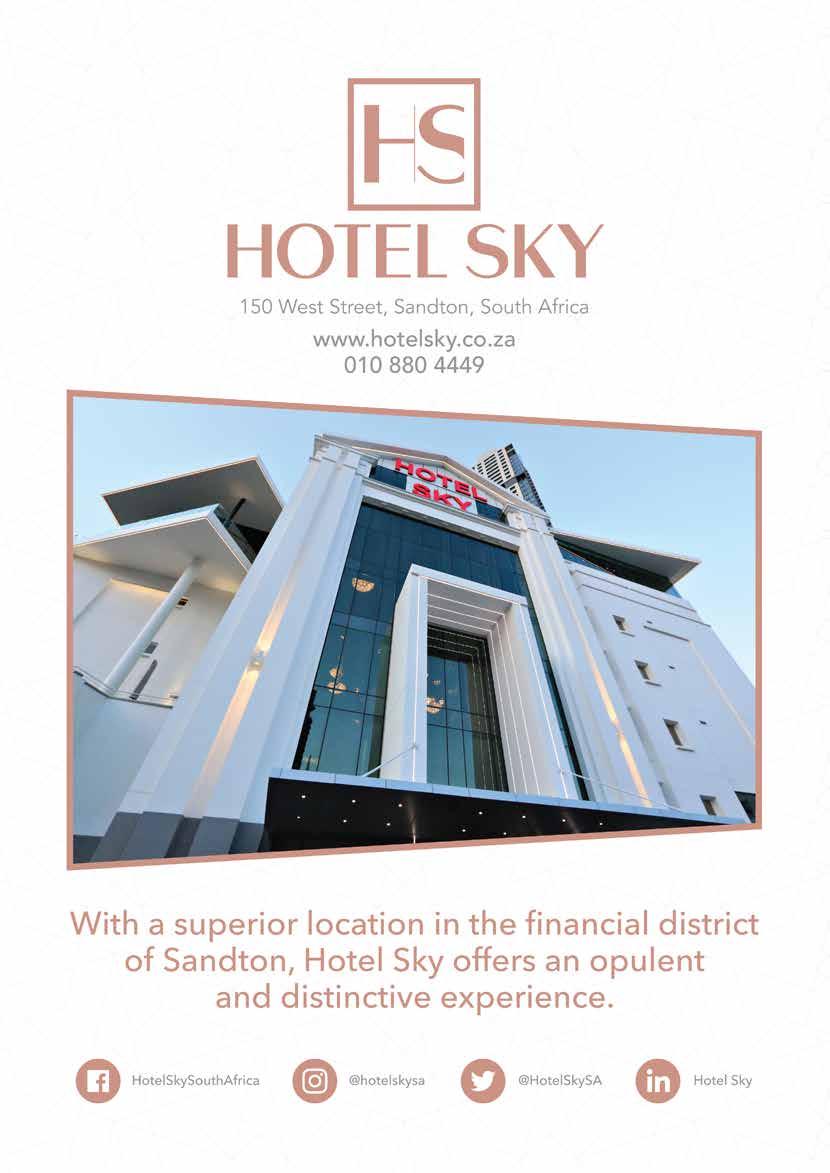
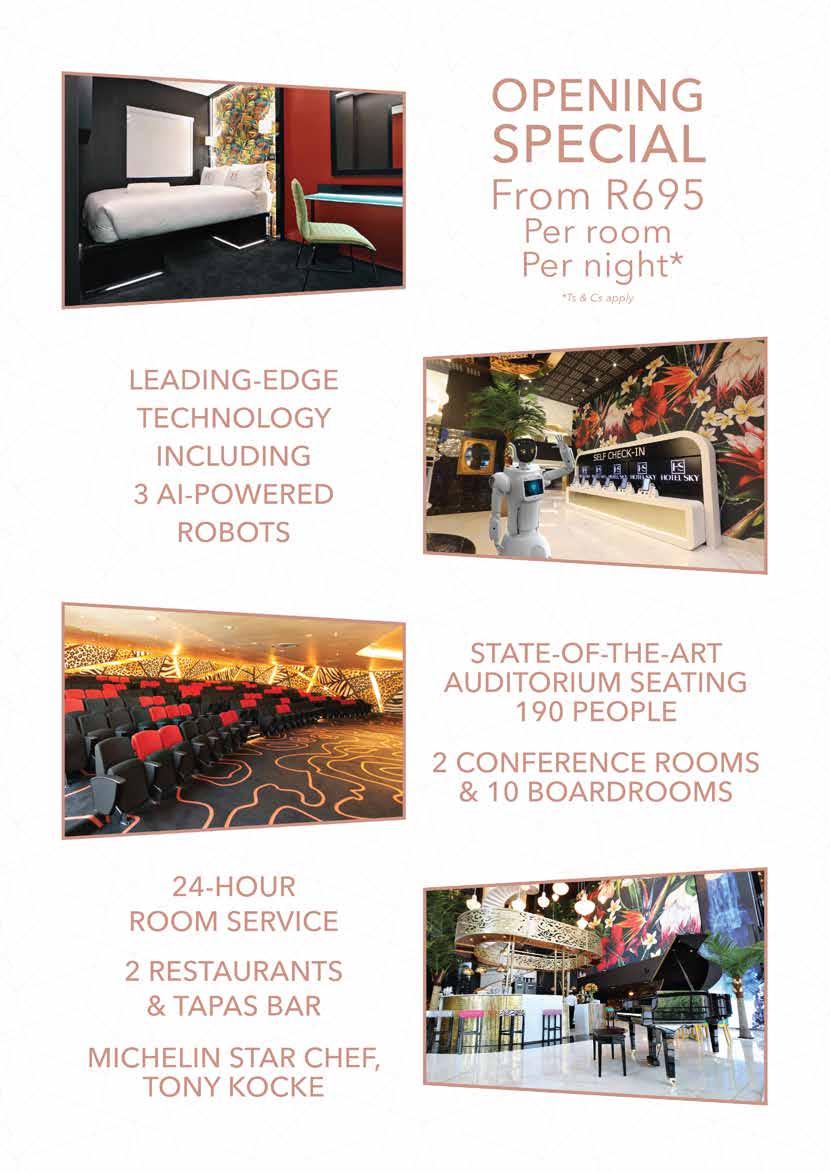
The year 2020 has been one that will forever stand out in our minds – through the hardships of the impact of the Covid-19 pandemic have come many learnings, some of which have helped organisers to understand what really draws audiences into attending their events.

What has become increasingly evident as lockdown restrictions kept people apart is that connections – and connectivity – have become paramount to how we move forward through what is a challenging period for all. Beyond building business, through our shared experiences, particularly during this time, we have been able to establish much deeper
connections with one another, and it’s all taking place in the form of meetings.









THE NEED TO UPSKILL













Stats from a McKinsey report, which covered what business recovery will look like as a result of the adverse economic effects of Covid-19, noted that the first eight weeks of lockdown saw digital adoption within business and consumer industries quantum leap by five years. This skyrocketing growth and trend towards new technologies, to ensure that meetings and connections are made, mean we need to keep pace with the tech and upskill in the right areas.
HYBRID DIVERSITY
Massive in-person conferences that run over consecutive days have, for now, been put on hold and it remains to be seen whether those numbers will ever be achievable again – at least in the short term.
According to data from the Professional Convention Management Association (PCMA) released during the last quarter of 2020, 76% of planners are taking their events virtual. Even prior to the pandemic, the push towards digital had already seen venues coming to the fore, with an assortment of innovative













offerings to provide bespoke eventing solutions for their clients.






Social distancing and travel restrictions in the current context mean that in-person attendance for small numbers of locally based individuals is possible, while the success of your virtual attendance boils down to what your platform can support and the strength of your marketing efforts. This also underscores the need to have a refined strategy of who we target because volume, in this instance, doesn’t equate to market growth.







Understanding your audience has never been so important. With time and money both being resources that would-be stakeholders are spending with increasing discernment, highlighting the value that your project or campaign can deliver on could possibly seal the deal on audience buy-in. Emphasising not-to-bemissed elements will ensure stronger uptake; however, all planning around this needs to be done with your target market in mind, while not losing sight of your business objectives.
Nowhere is the crossover between planning and marketing more evident than in a digital environment. From social media and email



Who could ever have imagined that everything we knew about events a year ago would change so drastically? Meetings gets to the heart of what 2021 has in store.
shots, to registration and platform hosting, this is where the entirety of your project will take place – venue and all marketing collateral included. The beauty of this is that much can be done in-house, with polls and surveys helping to capture feedback before the moment passes, and with far more ease. This gives much deeper insights into how to improve and tailor experiences more closely to what audiences want.
The circumstances of working and operating in a digital world make for a fascinating showcase: while much of our face-to-face connections have disappeared, during 2020, we saw just how valuable those connections are, with more people being digitally connected than ever before.
Human connection forms the very basis of society and we are hardwired to seek this out; so much so that successful and complete social interactions trigger our biological reward system and release dopamine – a neurotransmitter chiefly responsible for how we experience pleasure.
While many yearn for in-person experiences, we are learning to find a way around these restrictions and enjoy social interaction differently, in a way that means we can still see and speak to each other in real time.
One of the leading trends going into 2021 will be centred on empathy and the ability to connect with audiences on an emotional level. This means that our connections with each other are more authentic and relationships are strengthened because we are connecting as human beings.
Understanding audiences more holistically, rather than just in a business sense, will be
1 Focus on the human element
2 Create meaningful, purposeful experiences
3 Allow participants to inform event formats

4 Engage emotions over sensations
5 Don’t neglect on-demand or post-event campaigning
the differentiator going forward; people want and need to connect in a meaningful way. Additionally, connecting with each other emotionally will create a deep, long-lasting and memorable impact. Memories steeped in emotion are often retained better: people tend to remember first how they felt, followed by finer details such as what they wore and the weather.
“Virtual events and event elements are limited in terms of their ability to engage


all the senses – something planners are used to having at their disposal when it comes to designing experiences. But that doesn’t mean you can’t give attendees a memorable experience. The key is to engage them on an emotional level. Create content that resonates with your audience and relates to the challenges they face,” noted Event MB in a summary of The Future of the Event Industry virtual event, which was held at the end of July and attracted 10 000 registered attendees.

Given where we are currently in the Covid-19 pandemic, its full impact is likely to only make itself known in the years to come.
With the scales tipped against in-person gatherings, the sudden upswing in the use of social media is making a strong case for our need to communicate and exchange ideas, even more so in times of crisis. This shows in the numbers.
Figures from We Are Social’s Digital 2020 report show that, this year, the number of social media users reached 4.14 billion – that’s almost 60% of the world’s total population.
With the typical user now spending 15% of their waking hours on social media, it’s no surprise that there is a push towards platforms such as Facebook, Twitter, Instagram and LinkedIn, but what is it that makes these platforms so popular?
A BRIEF HISTORY
The growth of social media has exploded over the past two decades.
Around the turn of the century, social media started gaining traction, with one of the first true social media platforms, SixDegrees.com, launching in 1997. This allowed users to create a profile page and build their connections. The site was later bought for US$125 million, while a slew of other social media platforms started emerging.
In 2002, Friendster cottoned on to the novelty of building users’ networks by connecting “friends of friends” and allowing them to share their statuses and moods. Originally intended to be a dating site, its servers crashed as a million users flocked to the
platform. With Friendster unable to keep up, Myspace was primed to receive the demand by users to stay digitally connected; by 2005, the platform had amassed 25 million users. After it was sold to News Corp for $580 million in 2011, this signalled a sharp decline in its popularity and users deemed it “ultra-tacky”. Viant, Myspace’s parent company, was eventually sold in 2016 to Time Inc. for its user data with a price tag of just $35 million – a fraction of what it was originally bought for.
At this stage, Facebook had been growing steadily and in 2003, in its first year, it attracted a million users. Players such as LinkedIn – dubbed “Myspace for adults” –Twitter and YouTube then came to the fore to grow into the popular social media platforms we have available to us today.

At 2.7 billion active user accounts, Facebook is by far the most popular social media platform globally, although, it is not the go-to for decision-makers.
To put this in perspective, within the B2B market, 45.8% of decision-makers say that they use experiences such as conferences, trade shows and events to inform product and purchasing choices. By comparison, only 36.6% use social media to inform these decisions, which creates a unique opportunity for the MICE industry, particularly as we are seeing a crossover between the two platforms – more so while the pandemic runs its course.
Further highlighting the power of our need to communicate and do so in a specific way, Facebook Live reported a 50% increase in viewers between February and March, while Zoom and Google Meet became the fourth and fifth most downloaded apps between July and September, respectively. These follow on from Facebook and WhatsApp at second and third place, respectively, and, most tellingly, the video-based TikTok was the top downloaded app during this time.
As users of the internet, we have so much
choice available to us and all at the touch of a button, so it is important to identify why users are accessing social media and that we understand how they engage with this so that we can optimise our own social media strategies. A whopping 90% of global internet users access the internet for video content, while the other top motivating factors include music and radio streaming, with vlogs and podcasts also featuring as the top reasons compelling users to go online. This is an opportunity we should take note of when it comes to how we make use of social media and repurpose our content to suit each platform.
Operating within a vast ecosystem has also meant that our content can be easily and readily shared on multiple platforms and to many users at once. In addition, we can gauge how our audience is receiving this, with peaks in our views based on our marketing, as well as through engagements such as reactions and comments.
With 50.2% of internet activity taking place on mobile phones, these connections hold the lion’s share for how internet users access their favourite internet-based apps and services. However, figures for the year are presenting an unusual trend, with numbers having dropped by 3% between September 2019 and the same month in 2020. Usage on tablets and other devices such as gaming consoles and smart TVs has also fallen by a massive 28% and 25%, respectively.
So, where is the growth in new internet connections coming from?
Primarily, laptops and desktops are responsible for the 5.9% growth in internet usage and appear to be closing the gap between user access on mobile phones, with 47.1% of access being driven by these devices. At the beginning of 2020, stats showed that there was an 8.6% increase in mobile phone usage, which is indicative of how the Covid-19 pandemic has influenced user habits.
Due to the nature of the pandemic, it is currently unclear whether this growth is as a result of the change in work and lifestyle patterns, or if this is indeed a trend that we need to keep monitoring to ensure we don’t miss the boat on identifying key opportunities that are seen in the right place, at the right time, and by the right decision-maker.
Covid-19 has been a game changer for the way we work and the tools we utilise. Meetings delves deeper to understand the developments that are shaping how the events industry makes use of social media.
TOTAL NUMBER OF ACTIVE SOCIAL MEDIA USERS
SOCIAL MEDIA PENETRATION (USERS vs TOTAL POPULATION)
ANNUAL GROWTH IN THE TOTAL NUMBER OF SOCIAL MEDIA USERS
92%
79% 53% 73% +12.3% +453 MILLION
TOTAL NUMBER OF SOCIAL MEDIA USERS ACCESSING VIA MOBILE PHONES
4.14 BILLION 71%
While search and email are two major components of digital marketing that can be done in-house, social media is both the most popular activity people do online as well as the most challenging for businesses. This is because companies still look at social media as a promotional and advertising channel rather than as a grand arena to collaborate with social media users, primarily customers and influencers, and work them through a relationship funnel to incite word-of-mouth marketing for your brand in social media.”
VIDEO CALLS
PERCENTAGE OF TOTAL SOCIAL MEDIA USERS ACCESSING VIA MOBILE
Neal Schaffer, president of PDCA Social and author of The Age of Influence
SOCIAL MEDIA

The campaign was launched as Mauritius announced a phased reopening of the island’s borders. It is currently targeting nationals, returning citizens and expats, and long-term stay travellers facing the mandatory 14-day in-hotel quarantine period on arrival.
An exciting, interactive and real-time digital campaign designed to restore the image of Mauritius as a destination of choice for South Africans has been launched by the Mauritius Tourism Promotion Authority.
The #MauritiusNow campaign features live webcams, video footage and engages with Mauritian locals to celebrate the warmth, beauty and friendliness of this Indian Ocean island.

The campaign is designed to boost the destination’s image and present the facts in the aftermath of the recent oil spill incident. As ‘seeing is believing’, the campaign uses engaging visuals and real-time drone footage to remind the world that this beautiful tropical island remains a prime tourist and MICE-friendly destination with beautiful white beaches, the azure ocean and pristine lagoons, lush vegetation, luxurious resorts, a melting pot of culinary tastes and flavours, and a welcoming population.
A dedicated #MauritiusNow microsite (www.mauritiusnow.com) includes live video

footage captured by webcams installed at key locations across the island, to showcase the stunning sea, lagoons and beaches of Mauritius as they are now. This is complemented with spectacular drone footage offering a bird’s-eye view of various parts of the island.
A series of videos portray local Mauritians going about their daily activities to reassure travellers that the island is a safe and Covid-19free destination, buzzing with colour, energy and activity. The campaign also includes an update on various sustainability projects in action to rehabilitate the environment in the south-eastern part of the island.
Mauritius looks forward to welcoming you back, as soon as the current travel restrictions are lifted.
Visit www.mauritiusnow.com and www.mymauritius.travel,

Mauritius has recently introduced a Premium Visa to encourage visitors to come to the island for a long-term stay. This is perfect for anyone looking for a change of scenery to work remotely for a few months, retirees or families considering relocation. Who wouldn’t consider a ‘work, live, play’ option in such a stunning destination?!




The Premium Visa is valid for a period of one year, is renewable thereafter and is aimed at tourists, retirees or professionals.
The island’s modern infrastructure and scenic beauty provide the ideal environment to work remotely in a safe, scenic and serene location that is Covid-19 free.
For more information, visit www.edbmauritius.org/premium-visa.
For more information; contact Philippa Piguet (+27 (0)83 773 8445) /Janet de Kretser (+27 (0)83 973 3531) or email: mauritius@meropa.co.za.
Nervous about international travel during the Covid-19 pandemic? The Mauritius Tourism Promotion Authority has devised an innovative campaign to allay those fears and satisfy wanderlust.

When you have the volume, you can look for patterns in what Facebook users are interested in, versus what Twitter users are interested in, etc. This could help you understand what your audiences on different platforms are interested in, saving you time and money on successful content,” highlights BuzzSumo in its report.
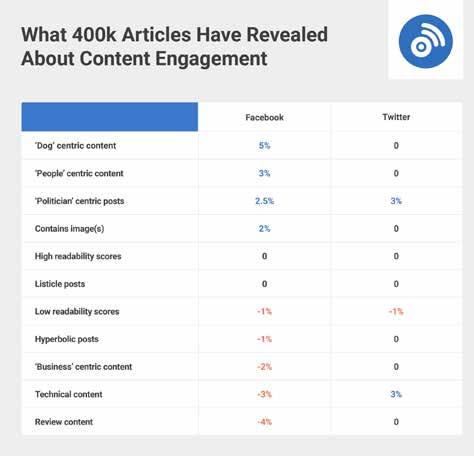
posts containing longer words and sentences received higher scores.
Getting your target audience to see you is one thing, while getting them to really receive your message is a completely different story altogether. The good news is that there is a way to understand how you can tailor your content, through some homework and an understanding of who your audience is.
Towards the end of November, BuzzSumo released a report detailing unique insights into 400 000 online articles. Through their machine learning models, they revealed the following:
• As a platform, Facebook is responsible for the majority of content engagement.
• The more ‘likeable’ the content, the greater the engagement around content.
• Amplification strategies on Twitter can successfully drive engagement.
• Tweaking content can be a differentiator. Considering Facebook currently holds the highest number of user accounts out of all social media, this is hardly surprising; however, the truth is that engagement success on one platform does not guarantee it on another.
Unless it is a press release or a statement delivered by a high-level figurehead, content can be refined to suit the unique preferences of not just the people who are being targeted, but the time and place it is seen. If you want to drill down to these specifics and better understand these trends, tracking your content is important.
“One way you can understand this is by keeping records of the content you release, and how much engagement it gets on different platforms.
Previously, it was accepted that simpler language held greater appeal, but the stats tell a different story and according to BuzzSumo, “Having a word length less than 1 000 words reduces the likelihood of high engagement on Facebook by 1%, while having 1 000 to 2 000 words increases the high engagement likelihood by 1%. Similar results were seen for Twitter.”
In addition, a feature of their model – the Automated Readability Index – indicates that
“It’s very interesting to see that the simplest language isn’t always the most engaging, even though that’s the advice that’s been passed around for ages. I think this speaks to one of the most important marketing principles: speak to your audience. All best practices come second to what your particular readers are looking for, and if you provide the content they want, you’re much more likely to engage them,” comments Amanda Milligan, marketing director at Frac.tl. This emphasises the growing need to understand your content ecosystem to exacting standards because, when it comes to your strategy, a blanket approach could see your content reduced to mere words on a page.
Formore,visitbuzzsumo.com.
Our online content strategies revolve around being seen among innumerable other items. Meetings learns what makes for compelling and engaging content that could give you the cutting edge.
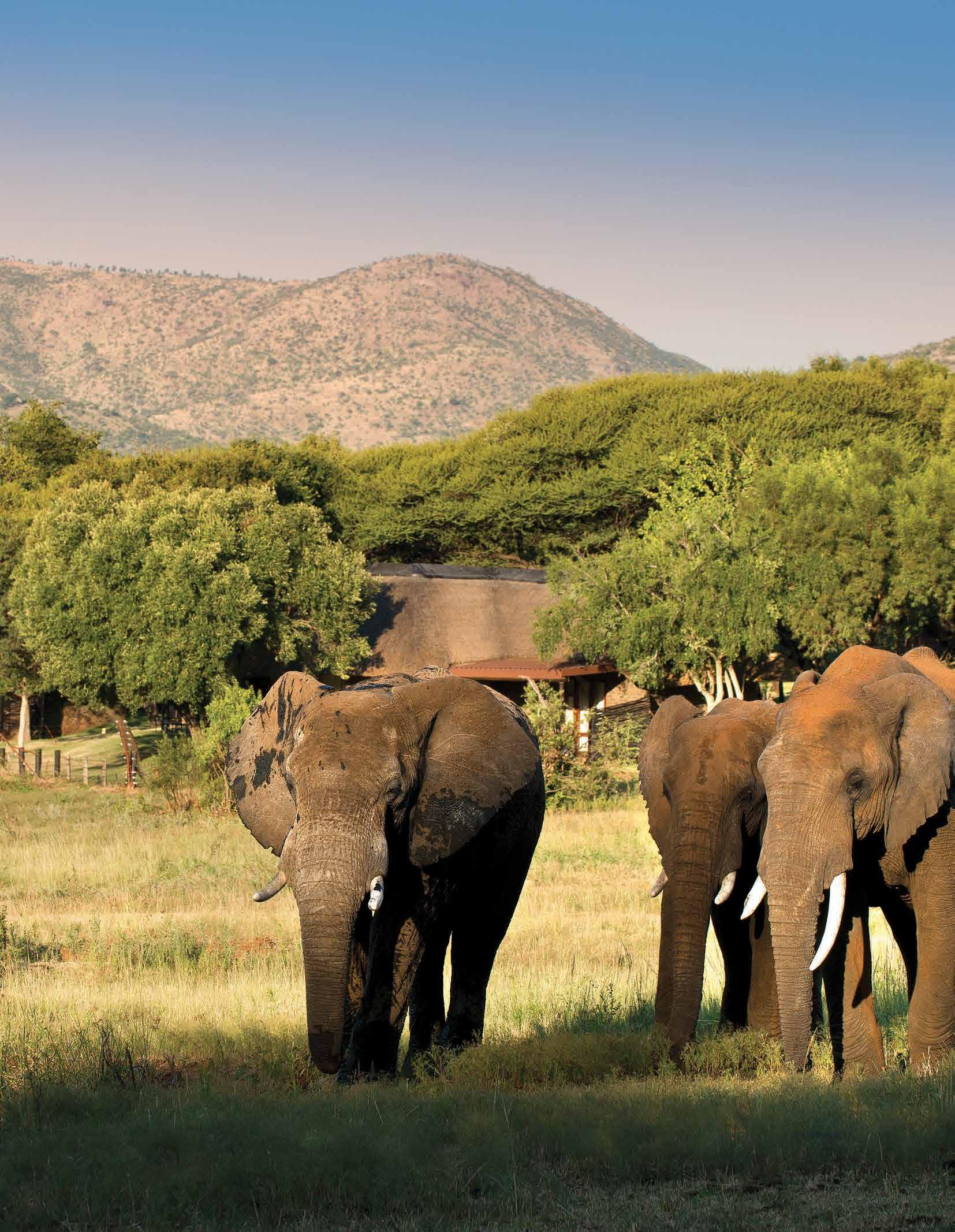

Where do you see the meetings and events industry currently?
It is currently very unpredictable. We have been doing smaller conferences with hybrid dial-in facilities and only a few larger corporate events and year-end functions. Our private functions have been booming, though, with a very busy December coming up.
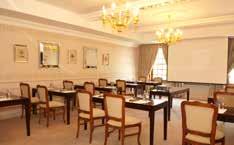
Where would you like to see the industry in the next 5-10 years?
While the impact of the Covid-19 pandemic is likely to affect business for quite some time, I’m confident that we will be back to where we were a year ago with the number of events we were hosting.
What role or influence do you believe your organisation plays in the industry?
With our clear emphasis on attention to detail and client satisfaction, we are a trend-setting venue that influences others.

What is the most challenging aspect of what you do?
Ensuring my clients achieve exactly what they are hoping to with each event, but this is also the most rewarding part!
What do you enjoy the most about what you do?
Making long-lasting relationships with my clients and have them come back to our venue time and again.

What was your very first job?
I started working part time at the age of 16 at one of the very first Pizza Huts in our area that offered… wait for it… deliveries –the only fast food place to do so!
What was the best piece of advice you ever received?
Your family is just as important as the work. Go home. The work will always be there when you return.
What drives you both personally and professionally?
My go-to attitude and lists of never-ending tasks.
What are some of your career highlights?
Meeting Nelson Mandela and Oprah Winfrey on two separate occasions. And even today, I know I have chosen the right profession when I walk into one of our rooms and the decor still gives me goose bumps!
Who were your role models growing up?
My dad and my gran.
Who do you currently aspire to be like and why?
My mom – she is such a strong individual who has overcome so much, with many sacrifices made on the way.
What quote best describes your outlook towards life?
“Gratitude is one of the most powerful human emotions. Once expressed, it changes attitude, brightens outlook, and broadens our perspective.” – Germany Kent
What values will you not deviate from?
My morals, honesty and trust.
What do people most often wrongly assume about you?
I tend to frown quite a bit, so people think I’m confused when they are explaining something in a meeting, but I
am just concentrating on what they are saying!
What is your favourite thing to do in your spare time?
Dancing (jazz, tap, Horton contemporary, Zumba), relaxing, reading and chilling by the pool.

What was your best holiday and why?
Last year April, we went to Thailand and met up with my sister and her family from Australia. It was wonderful spending time with them in the splendour of Thailand.
What are some of your ‘bucket list’ items?
Travelling to Walt Disney World, Florida, and road-tripping through France following the Tour de France.
What is your favourite read?
I enjoy many kinds of genres but currently, I’m reading the Virgil Flowers stories written by John Sandford, which are brilliant.
What three items do you never leave home without?
My phone, handbag and a bottle of water infused with lime and ginger.
What is your most prized possession?
My husband, Stuart, and daughter, Olivia, are most treasured but on a not-so-serious note, my Hunter boots – not that I get to wear them much in Joburg!
Proven best practice is used to guide most decisions when drawing up legal contracts for events. Since Covid-19 spread to our shores, it has introduced a new set of criteria that must be accommodated –while also introducing a huge amount of uncertainty.
“All parties to any contract need to be flexible, as we do not know how the pandemic is going to affect us, how long it’ll last, if it’s getting worse or better, or how it’s going to affect our contracts or venues,” says Dr Tyra Warner, College of Coastal Georgia, in a Planet IMEX presentation titled ‘Contracts and negotiations in a post-Covid-19 world’. “So where usually, as a lawyer, I would take out as much ambiguity from a contract as possible, I now have to try to build in flexibility.”
The law as we know it has not changed, notes Warner. Rather, we need to apply it differently, so that it makes sense in our new context. With this in mind, a number of legal aspects of contracts remain the same:
Duty of care: This is not a clause that is added to contracts, but a legal obligation that requires a business to adhere to a standard of reasonable care while providing facilities and performing services that could foreseeably harm others. In light of Covid-19, businesses have a duty of care to take measures to prevent the transmission of the novel coronavirus while carrying out their activities.
Indemnification: Many businesses request their clients sign an indemnity clause agreeing that they will not hold the business liable for any harm or

damage that comes to them through a specified transaction. Warner notes that in Georgia, USA, many businesses have put up notices to warn the public that upon entering their premises, they are assuming the risk of Covid-19 and that the business will not accept any liability in the case of death or injury from the disease. Cancellation vs forcemajeure: These are two avenues to terminating a contract. Cancellation is voluntary, whereby one party decides not to proceed with the agreement. They will subsequently be liable for any damages. Forcemajeure is involuntary and results in a contract being terminated because its fulfilment is no longer possible. Warner adds that fear of Covid-19 is not grounds for forcemajeure, whereas travel restrictions and prohibitions on gatherings that directly impact your event are.
In addition to the existing and already familiar clauses, a number of new Covid-19-specific clauses are now being included in contracts. Examples of these that she cites include:
Outlining space issues: Examples of the questions you may want to answer in your contract include: What social distancing requirements will be in place? How will changes in capacity affect room pricing? Will any spaces be shared with other events or customers?
Specifying service requirements: How many staff will be servicing your event? Will they be the same staff for the duration of the event, or will different staff take different shifts? You could even specify that masks must be worn correctly (e.g. not under the nose).
Pippa Naude writes on best practice when it comes to drawing up contracts during Covid-19, and aspects you should consider.
All parties to any contract need to be flexible, as we do not know how the pandemic is going to affect us, how long it’ll last, if it’s getting worse or better, or how it’s going to affect our contracts or venues.”
Dr Tyra Warner
Join
Advocate
Services and amenities: You need to spell out what will be available, as well as how this can impact on cost.
Cleaning and sanitation: It can also be useful to specify the cleaning and sanitation standards being used by an establishment. Ideally, you want one that is endorsed by an industry body – such as the Tourism Business Council South Africa ‘Travel Safe Eat Safe’ badge being used here in South Africa, which has the World Travel & Tourism Council ‘Safe Travels’ stamp of approval. This carries greater authority than an establishment creating their own set of protocols, and it is far easier to check that the protocols were being properly adhered to in the case of possible negligence.
Warner adds that should you need to postpone an event, it is important to create a new agreement in writing. This should cover everything from the new dates and any changes to the event format or facilities, to what the cost implications are, and so forth. This way, you have something solid to work with – even if your point of contact changes.
Above all, it is important to keep in mind that these guidelines do not constitute legal advice. Every contract needs to address the unique needs of each specific agreement taking place, which can vary greatly.
DISCLAIMER: Each case depends on its own facts and merits. The above does not constitute advice and independent advice should be obtained in all instances.
While not an exhaustive list, Advocate Louis Nel – AKA Louis the Lawyer – frames just some of the aspects you can consider when looking at the Protection of Personal Information (POPI) Act (No. 4 of 2013):
1 Appoint an information officer to be responsible for the Consumer Protection Act (No. 68 of 2008) compliance
2 Analyse how your business currently deals with personal information
3 Update your privacy policy
4 Communicate new POPI processes with your clients
5 Update your contracts with suppliers
6 Look carefully at any cross-border dealings (POPI applies to the processing of personal information in South Africa, for both parties who reside in South Africa or those who reside elsewhere)
7 Update your employee contracts, training and internal awareness

8 Update your terms and conditions
9 Ensure you have good security safeguards in place to protect any personal information you are storing
10 Update your direct marketing strategy to comply with POPI
11 Review and revise your storage and deletion policy where needed.
Please give us an overview of where you currently see the business and leisure tourism industries, both locally and internationally?

A trend that started as a trickle is now a river making inroads across the globe. This is resulting in a new mindset that has seen businesses reinventing themselves from a monistic approach to a more pluralistic one –accountable to and for the greater good of society. And it demands that aspiration and talking be redirected into measurable actions, not lip service.
The Covid-19 pandemic has flagged many disparities in this world and laid the global mainstream tourism sector down to bleed. It has put the brakes on the sustainability of the travel and tourism sector – both in terms of domestic and international business and leisure tourism.
Within the MICE industry, we have equally exciting opportunities.
Listening to the
trends and being open to them, one will ‘hear’ that people yearn for ‘wide open spaces’ and human interfaces. Would it be controversial to suggest the option that we consider holding smaller events in an expanded portfolio of destinations for fewer delegates, with larger numbers tuning in from afar?
Following tragedy, a new travel world order has begun. I find this heartening and exciting.
What do you feel we can expect for these markets beyond the Covid-19 pandemic?
After the pandemic, people will seek more meaningful travel. For many, the tourism of tomorrow is trending significantly towards humanity and the universality of people in their environment, of which they are the ultimate custodians.
An honest, serious question we need to ask ourselves when we consider tourism sustainability in South Africa is that if it hadn’t been for the pandemic, would the majority of tourism businesses have continued to do as they did before, forever more? Are we using

the opportunity to actively put tourism to work to enact its unique potential to be the most powerful builder of intracultural transformation, bring about significant social change in South Africa and build the universal harmony that large swathes of future tourists will be seeking? It’s possible!
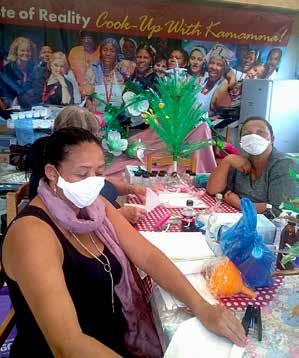
Money will be tight; however, what visitors want what will result in them turning to a destination that is also changing. We have much competition north of our South African borders and seeking new partnerships and alliances and thus access to new markets seems sensible.
Why should MICE be a focus within tourism?

Instead of the MICE market defaulting to its familiar ways, those who milked the front udder of the cow should look at geographical spread and contributing to growth and knowledge transfer by unlocking business opportunities for large and small businesses across South Africa. There is definitely a need for people to meet. Yes, for now, socially distanced, but human engagement has emerged as one of the top needs of the human race. Hurray!
In terms of projected income streams contingent on the number of registered delegates, I believe that the MICE industry is particularly suited to offer higher accessibility to more attendees with less income to pay less to attend. MICE experiences build harmony, bridge cultural divisions and provide a levelled playing field where social cohesion, which is much needed in South Africa, can be encouraged. If the MICE sector facilitates something where people really want to go, they will go.
Dreamcatcher South Africa took its first steps to pioneer community-based tourism in the 1990s. Founder Anthea Rossouw shares her journey.La Bloemen Botanical Garden arisen on a former waste dump site in Melkhoutfontein Dreamcatcher Kamammas preparing Covid-19 PPE packs for vulnerable individuals Homestay with Kamamma: meeting the locals
What are your aspirations for the business and leisure tourism industries and where would you like to see these important economic drivers within the next 10 years?
As an itinerary planner, Dreamcatcher provides experiences across South Africa. Through this, we empower tourism service providers spread across the country to grow.

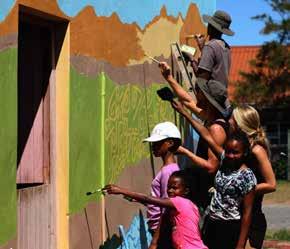
It is time to turn great aspiration into sustainable endeavours. Tokenism cannot work. Organisations, visitors and the market are looking at the current sustainable organisations in South Africa. Youth question why they are still in the same position as when Madiba was released. We are currently proudly collaborating with the Department of Education on the new E-3 (enterprise, education, employability) curriculum to instil the vision and mindset into youth at school to consider enterprise beyond the typical ‘school tuckshop’ approach.
I believe that as a collective of partners, which does not exclude other disciplines and communities, tourism could be one of the most significant nation-building tools.
Tourism has the potential to create far more jobs than it historically has – but the ‘get rich quick’ mindset must be replaced with a ‘hard slog’ mentality.
Recently, a tourism crafting enterprise on our routes noted during an interview with an international journalist: “The fire is burning in me because I am now an enterprise, but I must keep working – I learned that being a tourism enterprise is hard work… I am excited by my future.”
A tourism degree alone doesn’t guarantee success – you need humanity, guts, vision, innovation, hard work and a love for a South Africa that is bigger than the challenges, which we can turn into opportunities. We also need training that drives purpose.

With tourism as a transformation tool, addressing bias – oftentimes unconscious –and enabling visitors to experience and have fun with our people are what will help our country and our sustainable futures. The bread and butter of tourism lies in putting humanity back – not staged cookie-cutter tours and bus window experiences.
The development of more products and destinations that are different to the pre-Covid itineraries unlocks new market segments that we could expose domestic and international visitors to. It is time for deliberate, wise and courageous change.

What message would you like to share with clients and stakeholders within the tourism and MICE sectors?
In South Africa, the time has come in which we should ask ourselves, and each other, truthfully: “What can I do with my tourism product for South Africa?”
Six months into the pandemic, a Dutch visitor wrote to me saying: “I came to South Africa based on glossy brochures and slick presentations, portraying animals and high-end luxury. I was stunned to see so much hardship and I found that the services I stayed with had no friends or real contact at grassroots. I could not rest until I had delved deeper into the country. Though beautiful and adventuresome, I felt I could not leave before I met the local people to find out what life was like. And I found on my visit to the township community, unlikely patience, humanity and happy smiles in the handshake of the Dreamcatcher Kamammas. I can still smell their freshly baked bread as we broke it together. What struck me was their honesty and love for their country – in spite of their desperate struggling and challenges. I found humanity – the spirit of ubuntu. I shook hands not with a lion, but with the real South Africa – the people Nelson Mandela spoke of… magic.”
Dreamcatcher South Africa is a BBBEE Level 1 135% procurement accredited entity. In 2000, it was mobilised to awaken the sleeping giant of tourism to transform it into a transformation tool to stimulate a new growth sector. During the Africa Tourism Leadership Forum held in October, it won a number of accolades, including the Championing Sustainability Award 2020. www.dreamcatchersouthafrica.com
In conclusion, we need to work deliberately to enable inclusivity and diversity and expect to be held accountable. It is vital that we all try harder to do better to be the change. The first step starts within us. That time is now. Let’s get on with it.











Kicking off at the end of October with six candidates, the Women in MICE Mentorship Programme has underscored the growing need for mentorship that makes a difference.

The Covid-19 pandemic has resulted in a lot of change. Some of this change, such as the lockdown restrictions, is temporary while we ride out the worst of the virus. Other change, such as the implementation of bolstered hygiene standards and protocols, is likely to stick going forward because, without these measures, we know that we are at risk of another health threat on the scale of the current pandemic.
Then there have been changes to how we connect – a game changer and key in how we have managed the pandemic. We have seen businessowners and decisionmakers refining their approach in how they communicate with their teams and that they are doing so in such a way that
places a strong emphasis on the value of human connection.
GIVING BACK
In 2018, Meetings magazine – together with the support of the South Africa National Convention Bureau – launched the Women in MICE Mentorship and Development Initiative. This was intended as a resource for women within the industry who wanted to give back through mentorship. During this year, the initiative has gained momentum and saw the official roll-out of the pilot Women in MICE Mentorship Programme in partnership with Queen Ramotsehoa, executive coach and founder of the Tsheto Leadership and Coaching Academy.


As we noted earlier in the year, when we launched the mentorship programme, “In times of crisis, strong leadership is imperative for guiding and reassuring those who need it while still achieving key business objectives.” This has formed the thrust of the programme that has welcomed the participation of six candidates – namely, South Africa-born Angeline van den Broecke, director: Global Business Development and Marketing for Kuala Lumpur Convention Centre; Angelique Smith, co-owner of Event Synthesis; Cindy Pereira Buser, owner and managing director of Mirchee and Weddings in Africa; Lindsey Verfaillie, senior sales and event coordinator at Durban International Convention Centre; and Lisa-Jade Hutchings, founder and

Shanna Jacobsen highlights the key outtakes.
head ginger at GingerBiscuit, together with Nthabiseng Mathole, head biscuit at GingerBiscuit.
One of the qualities the mentorship programme aims to encourage is resilience.
“I like resilience as a tool because, during this crazy time, we have been knocked over so many times, and it is the ability to bounce back quickly that is going to enable us to keep going and succeed,” explains Queen.
By definition, resilience tests a person’s ability to rise up and come back from adverse experiences stronger than before.







“Some of the principles that have guided me have come from spending time with other women and people that I’ve worked with and who are part of my family and friendship circle that have really been inspiring,” comments Angeline.

An important aspect for her that is also the foundation of mentorship is reciprocity. This is pivotal to the very concept of mentorship, and gives us the opportunity to share but also to learn. If we are willing to facilitate engagement and connect with others, we are also learning from that opportunity. When I think of reciprocal relationships, I think about collaboration and partnership, of giving and receiving. Listening is also about a reciprocal process, which exists as a give-and-take dynamic, and requires equal commitment by both a mentor and mentee.
Using her personal experiences, Angelique touches on some of the qualities that leadership encompasses.
“I worked in corporate shortly after matriculating and had two bosses; one was a dictator of note but if anything went wrong in our department, the other boss would immediately assume the blame because he was of the firm belief that if something had gone awry, he hadn’t done his job as a leader. This has been my go-to for more than 22 years,” she says.

Some of our mentorship programme candidates have had experience in leadership from their youth. For Cindy, her journey has also meant overcoming personal hardship.
“It started for me when I was chosen as the head prefect at school, where I was given this position by the school to lead,” she recalls. She sadly lost both her parents at a young age but it also meant she had to take on a lot of responsibility during her youth.
“Having worked with teams of all sizes, I have always felt there was a need for me to teach and inspire. Over the years, it has given me immense satisfaction to see colleagues who have moved up from where they started and know that I have contributed in some way to their success,” Cindy enthuses.

Lisa-Jade believes that owning our story is equally important in nurturing a mentorship relationship. In order to create an environment that is conducive to sharing these stories and facilitating the mentorship
mental and emotional barriers to success and equip mentees with the necessary tools to build towards achieving goals.
“With awareness as leaders, we are better able to show up for others in a manner that is both compassionate and open. Through this process, we can relate on a deeper level to those around us – we cannot support others along their journey unless we have acknowledged our exploration of life with grace and acceptance,” she says.

Passionate about youth development, Nthabiseng believes this exchange forms the basis of mentorship.
“Mentorship is about drawing on one’s experiences and hopefully helping somebody else to avoid the same pitfalls. It is about guiding people, whether they are young or old; but in order to lead, it is important to have people whose hearts are in the right place,” she says.
Authenticity is a clear theme throughout the mentorship journey, and this also resonates with Lindsey. In addition to being a mother, she feels her professional experience has also inspired and motivated her to be forward-thinking and solutions driven.
“Working at Durban ICC, I have been very lucky to be surrounded by a lot of people over the years who have encouraged me to be myself – to be true to myself and never
Vulnerability has long been viewed as a weakness when, in reality, leaning into vulnerability with oneself and others is the ultimate sign of strength. This quality fosters connection, opens our eyes to gratitude, and paves the way for
The end of November saw Specialised Exhibitions collaborate with a number of notable industry players to bring us the Restart Expo. As official media partners, Meetings and The Planner Guru were part of the action.
Towards the end of November, the impossible happened. After the many months of lockdown with limited numbers at social gatherings, the Restart Expo made a splash as an exceptional showcase of how the exhibitions industry can safely host live events.

Run over two days on 25 and 26 November 2020, and held in Hall 8 at the Johannesburg Expo Centre (JEC), attendees were abuzz with enthusiasm and excitement for one of the first in-person exhibitions to take place since the beginning of lockdown in late March. With an emphasis on cleaning, hygiene and social distancing protocols, no stone was left unturned to ensure all measures were taken to keep delegates, exhibitors and speakers safe. This included:
• compulsory Covid-19 questionnaires
• contactless pre-registration
• hourly visitation slots during which numbers were capped at 250

• step sanitisers at every entrance and exit point
• pre-packaged delegate badges and food items
• zoned entry and exit walkways
• temperature checks
• seating at least 1.5 m apart
• complimentary masks
• sanitising of seating and podiums inbetween sessions
• health and safety officers to oversee the adherence of protocols.
One of the main drawcards of the event was the seminar theatre that saw participation from a number of industry heavy-hitters, including Craig Newman, group CEO of GL events SA; Sisa Ntshona, CEO of SA Tourism; and Barba Gaoganediwe, CEO of Gauteng Tourism.

Emceed by Alex Granger, proceedings for the day ran smoothly and kept to schedule.
Craig gave the official welcome and thanked the industry for its support of the Restart Expo concept.
“We are not doing this as a showcase of any individual or company or organisation but as a showcase of the industry as a whole… this is being done to showcase to the authorities that we can do this without limited restrictions,” he noted, adding that compliance with measures was key. Barba was next to come on stage. His session had the audience enthralled, as he delivered a presentation on the important and strategic role that the business events sector plays in our economy as it extends to a multitude of other areas. In order for this potential to be realised, however, it is going to take a unified effort by the industry and government, Barba said.
“Part of the mistake we make as government is to sit and plan for you. We develop targets, without you, and come back and say ‘let’s implement’. So we have decided today that we are going to share some of the key things that we are looking at – driven by the Growing Gauteng Together 2030 Vision – and solicit your participation, partnership and support,” he urged.
Following on from Barba’s presentation, a panel on the event safety protocols took place that focused on the use of technology to ensure that all measures are in place to have successful events. This saw participation from Kevan Jones, board member of the SA Events Council and executive director of the Southern African Communications Industries Association (SACIA); Andre Erasmus, EMS Fire Safety: Events for the City of Johannesburg; Bongani Khoza,
“The Restart Expo was key in demonstrating the distinction between mass gatherings and business events, with the opportunity to motivate the government to increase the limit to at least 50% of venue capacity for business events.”
Projeni Pather, chairperson, Association of African Exhibition Organisers
operations director at Lodge Events; Shaun Bird, GM of Sandton Convention Centre; Hannes Venter, GM at the JEC; and Projeni Pather, chairperson of the Association of African Exhibition Organisers (AAXO).
After lunch, SA Tourism’s Sisa came on stage to reveal the role the MICE industry can play in defining targets at a government level. SA Tourism is responsible for making a case for the government support it receives. This means that Sisa has to sit before Parliament to set KPIs for the entire length and breadth of the tourism industry, which also encompasses business events. With greater collaboration in the industry as a whole, these targets can be more clearly defined, which will ultimately result in greater support by government.
The day concluded with AAXO’s graduation ceremony, as well as a discussion between Projeni and AAXO board member Suzette Scheepers on why it is pertinent to open up the events industry.
Day 2 of the Restart Expo kicked off with Tshifhiwa Tshivhengwa, CEO of the Tourism Business Council of South Africa, talking on the impact of Covid-19 on the South African economy and tourism industry, as well as the business events industry.
He acknowledged that the lockdown has been brutal for the full tourism value chain, which the MICE sector sits within. However, he was also encouraged that, through the industry’s efforts lobbying government, the risk adjusted strategy has seen many aspects of tourism reopen sooner than initially forecast. For example, international travel was earmarked to only resume from the start of 2021 but instead opened last month. The Restart Expo is another shining example that we can hold events safely and responsibly, ahead of when it was anticipated events would resume.
Despite the progress we have made, Tshifhiwa also admitted that we still have a lot of work
Endorsed by:
• AAXO
• SA Events Council
Member of:
• UFI
In partnership with:
• Gauteng Convention & Events Bureau
ahead of us. To this end, he encouraged the public and private sector to “hunt as a pack” and work closely together to be more effective at achieving common objectives.
Mmaditonki Setwaba, the acting deputy director-general and chief: Legal Services at the Department of Tourism, commended the Restart Expo for its well-demonstrated ability to comply with the Covid-19 health and safety protocols, and its efforts to aid in the recovery of South Africa’s economy. She noted that – in line with its objectives to grow the economy, alleviate poverty and create jobs – the South African government is committed to growing the events industry and investing money in its recovery while also improving buyer access to the local market.
In thanking Mmaditonki for attending the Restart Expo, Craig noted that a case study of the event will be compiled and presented to the Minister of Tourism and other industry associations. This will provide a benchmark for safe events and demonstrate how business events can be safely restarted.
The final address of the day came from Kai Hattendorf, CEO of UFI (the Global Association of the Exhibition Industry), titled ‘We open, we gain and we bounce: Opening up of the exhibition events industry’.
Kai stressed the core message that the international business events community has been delivering to governments around the world over the past few months, which is: “Exhibitions, conferences, business events are not part of the problem of Covid; they are part of the solution for Covid. We build the meeting places and the marketplaces for industries to come together, for people to connect, for supply to meet demand, for business to restart… let us in. We can bring everyone back together. We are the fastest of the fast-tracks to economic growth.”
He noted the challenge that had arisen from business events being bundled into the category
of mass gatherings, despite their professional and controlled environments. Only Germany has taken steps to recognise business events as a distinct type of gathering with an important economic purpose. Germany and Italy had also taken the step of classifying attending a trade show or conference in their country as essential travel. According to Kai, the projected total impact business events have on GDP around the world is US$198 billion (R3.1 trillion).
Commenting on the wrap-up of the Restart Expo was Gary Corin, managing director of Specialised Exhibitions: “Listening to our seminar speakers talk about the tourism aspects of what needs to be done to help our local economy recover and bounce back, it shows how exhibitions, events and conferencing have an enormous role to play.”
The Restart Expo initiative was driven by Specialised Exhibitions, a division of Montgomery Group, together with the JEC. They would like to thank all sponsors, and supporting association and organisational partners:
Official media partners:
• Business Events Africa
• Meetings
• Platinum Gold
• The Planner Guru
Supported by:
• Barmotion
• Be the Solution
• Downings Marquee and Tent Hire
• EMC
• Ethos Productions
• Expo Guys
• Expo Services
• GL Events
• Indusnet
• Inhouse Exhibitions & Logistics

• Jodene Shaer
• Larouxnelle Logistics & Consulting
• Lodge Safety & Security
• Main Event Catering
• Microfog
• Orange Orbit
• Pinnacle Welding & Safety
• PR Partnership
• RSA Draping & Balloon Specialists
• SA Tourism
• Screencom
• Tixsa
• Tree-Mendous
• Website Ink
• Wires & Wireless
• ZF Cleaning
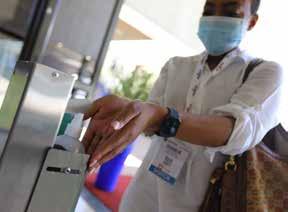
With borders slowly opening up to receive international arrivals after the Covid-19 pandemic put most travel on hold, Meetings investigates just some of what can be expected when landing on foreign soil for those who are keen to visit those bucket list destinations.


Since modern Egyptologists uncovered the extent of the nation’s archaeological bounties, Egypt has remained one of the world’s top international travel destinations. If the travel bug has bitten, Egypt – home to the Great Pyramids and Sphinx of Giza, as well as a number of ancient archaeological sites that have fascinated so many – is one of the more viable countries to take a trip to. You will, however, need to familiarise yourself with the current regulations, which are partially restrictive.
wanderlust
thewishtotravelfarawayand tomanydifferentplaces
In order to gain entry into Egypt, a completed public health card must be submitted. Travellers arriving from Argentina, Australia, Bolivia, Brazil, Canada, China, Colombia, Ecuador, France (Paris), Germany (Frankfurt), Guyana, Italy (Rome), Japan, Mexico, New Zealand, Paraguay, Peru, South Korea, Suriname, Thailand, UK
(London and Heathrow), USA, Uruguay or Venezuela must present a printed copy of a negative RT-PCR test conducted by an approved laboratory that is not older than 96 hours from the last departure flight to the country. Travellers from any other country must carry a print-out of a medical certificate with a negative Covid-19 result
taken 72 hours prior. Passengers arriving in Cairo from Hurghada, Sharm el-Sheikh or Taba without a negative certificate may be subject to a PCR test at their own expense (around US$30).
With a number of famous and historical attractions – including the Arc de Triomphe, Eiffel Tower and 12th-century Notre Dame cathedral – Paris, France’s capital, is one of Europe’s major city centres and a global hub for art, fashion, fine dining and culture. It is also home the world’s largest art collection housed in the Louvre Museum, which includes works by Michelangelo and Leonardo da Vinci.
Like with most nations around the world, travel to France is partially restricted – and with good reason; the country’s current Covid-19 figures mean that it has the fifth highest number of infections in the world. Presently, entry into France is limited only to French nationals and passengers from Andorra, Australia, Japan, Monaco, New Zealand, Rwanda, San Marino, Singapore, South Korea, Switzerland, Thailand, Vatican City, the UK and members of the European Economic Area. This includes spouses and children. Travellers with a Laissez-Passer (permit), diplomatic, official or service passport or a residence permit issued by a limited number of these countries will be allowed entry. Merchant seamen, students and those with a confirmation of being an unmarried partner of a French national will also be permitted to cross into the country with a written invitation from the national of France.
If arrivals fall under one of these specified areas, those travelling from Algeria, Bahrain, China, the DRC, Ecuador, Iran, Iraq, Israel, Lebanon, Morocco, Panama, Russia, South
Africa, Turkey, the UAE, Ukraine, the USA or Zimbabwe must have a medical certificate with a negative Covid-19 test result taken at most 72 hours before departure from the first port of travel. An International Travel Certificate must also be completed and presented upon arrival and during any transits in France, which can be obtained at interieur.gouv.fr.

The Great Wall of China has held allure for so many and remains a top bucket list attraction. Visible from space under the right conditions, the wall and other barriers that are part of the structure are estimated to extend a total of 21 196 km. Other impressive sites such as the Terracotta Army collection in Xi’an are also not to be missed.

With China being such a vast landmass, your trip will need to be planned carefully. Due to travel to the country being partially

restricted, this bucket list item may not be possible until a later date for some.
According to the IATA Travel Centre, entry by foreign nationals into the mainland of China holding a visa is suspended. This doesn’t apply to those with a visa issued after 28 March 2020 if the place of issue is outside China, but travellers cannot arrive from Bangladesh, Belgium, France, India, Italy, Philippines, Russia and the UK. This also does not apply to foreign nationals with diplomatic, service, courtesy or C visas, or
those with a visa issued after 3 November 2020. Additionally, certain port visas, visa-free transit policies, and visas specified for foreign tour groups of ASEAN countries have been suspended.
Those seeking entry into and departure from China must provide completed exit/ entry health declaration forms, which can be obtained from http://health.customsapp.com. Travellers arriving directly from Argentina, Austria, Belgium, Brazil, Chile, Czechia, Denmark, Egypt, Ethiopia, Finland, France, Germany, Greece, Iceland, India, Indonesia, Iraq, Ireland (Republic), Italy, Jamaica, Jordan, Kazakhstan, Kenya, Malaysia, Mauritius, Mexico, Montenegro, Namibia, Nepal, the Netherlands, New Zealand, Norway, Pakistan, Philippines, Romania, Russia, Saudi Arabia, South Africa, Spain, Switzerland, Syria, Thailand, Turkey, the UAE, the UK or Zimbabwe must have a green QR code with an HDC mark, or an official health declaration form issued by a Chinese consulate or embassy. The code or form must be submitted together with negative Covid-19 nucleic acid and IgM antibody test results, issued at most 48 hours before departure to China.

Frank Sinatra coined and popularised the name ‘The City That Never Sleeps’ for the city of New York in a line from his song ‘New York, New York’ and, as a destination, it remains high up on many travellers’ bucket lists. The bustling, expansive city has a number of attractions made especially desirable to visit, with the Empire State Building, Times Square, the Statue of Liberty and Central Park being some of its most iconic visitor hotspots. Passengers arriving from Austria, Belgium, Brazil, China, Czechia, Denmark, Estonia, Finland, France, Germany, Greece, Hungary, Iceland, Iran, Ireland (Republic), Italy, Latvia, Liechtenstein, Lithuania, Luxembourg, Malta, the Netherlands, Norway, Poland, Portugal,
Slovakia, Slovenia, Spain, Sweden, Switzerland or the UK will not be allowed to enter the USA. This currently doesn’t apply to US nationals and permanent residents, spouses of US nationals, or permanent residents, as long as a marriage certificate is provided. The travel restriction also does not apply to parents, siblings or legal guardians of unmarried citizens or permanent residents who are younger than 21, or the child, foster child or ward of a national or permanent resident of the USA. Passport bearers carrying certain visas will be permitted entry and passengers arriving in New York State must complete the Traveler Health Form at https://forms.ny.gov/s3/Welcome-to-NewYork-State-Traveler-Health-Form.
Situated at an elevation of 2 430 m above sea level and nestled within the Andean mountain range in Peru lies the Machu Picchu complex built by the Inca Empire – a hugely popular historical site in Peru that has attracted millions of visitors throughout the years. It was named a Unesco World Heritage Site in 1983 and, while many speculate what its exact use was,
it is most famed for its precision architecture that makes use of dry stone walls built from massive blocks and no mortar.

Sadly, for those yearning to travel to the impressive attraction, all flights have been suspended to Peru, with arrivals permitted only from a restricted number of ports. These include Asunción, Atlanta, Bogotá, Brasília, Buenos Aires, Cali, Cancún, Cartagena, Córdoba, Guayaquil, Houston, Iguazú, La Habana, La Paz, Los Angeles, Medellín, Mendoza, Mexico, Miami, Montego Bay, Montevideo, John F Kennedy International, Newark Liberty International, Orlando, Panama, Porto Alegre, Punta Cana, Quito, Rio de Janeiro, Rosario, San José, San Salvador, Santa Cruz, Santiago, São Paulo, Toronto and Tucumán. This does not apply to repatriation flights.
All travellers must upload either an antigen test result, an epidemiological medical discharge certificate or a medical certificate with a negative Covid-19 RT-PCR test that isn’t older than 72 hours and taken from the first point of departure to http://e-notificacion. migraciones.gob.pe/dj-salud, where they must also sign an Affidavit of Health and Geolocation Authorization. Passengers who are younger than 12 years old are exempt from this but must have a medical certificate of good health.
Please note that all information pertaining to international Covid-19 travel regulations was correct at the time of writing. These insights do not encompass the full travel requirements for each country and, due to the constant changing nature of these restrictions and regulations, it is important that you consult with airlines and local travel agents on the latest advisories before planning and booking your trip.
Further guidelines can be viewed at www.iatatravelcentre.com/world.php.
At just 30 years old, Adrian Vigus-Brown is the executive chef at the African Pride Melrose Arch, Autograph Collection Hotel in Johannesburg. He shares his culinary insights with Meetings

How has the food and beverage industry changed over the past five years?
The industry was moving at a nice pace towards social dining with a good variety of establishments as well as clientele frequenting establishments. At one point it, looked like opening a kitchen was a sure way to make a success of business; however, as Covid-19 hit, that is no longer the case – at least not for the foreseeable future.
What are some of the current trends in the food and beverage industry?
It’s a hard one to answer – with where we are currently, we cannot talk about when Covid-19 ‘ends’ but, no doubt, there will be some new and interesting trends coming to the fore.
What would you identify as the primary mistake people make when catering for conferencing?
Overcomplicating food and serving food that isn’t suited to conferencing, which can frustrate the organiser and delegates.


How can one present plain food in a way that appeals to delegates?
Plain food? To me there is no such thing – all food can and should be appealing, and it is all in is how it is presented.
What is your favourite dish to make?
I love using not just the secondary cuts of meat but also the process of brining and fermenting –for me, this style is exciting but also highlights the nonmainstream cuts of meat, which are amazingly flavoursome.
What is your number one catering tip?
Cook for your guests and not for your ego – and buying cheap ingredients does not make good food!
What is your favourite kitchen gadget?
It’s a close call between a pressure cooker and a bowl blender.
What dish are you asked to make most often?
My braised lamb shank with charred root vegetables – it’s saucy, soft, on the bone and melts in your mouth! My slowbraised beef short rib with parsnip mash also shows what beef should taste like – absolutely delicious!
What is your favourite food?
Any food prepared well and packed with flavour. I love almost all types of food.
Are there any foods you just do not like?
Seafood and shellfish.
Did you eat your veggies as a child?
I loved them!
What is one ingredient you cannot cook without?
Onion. It is the base of all amazing things.
When did you know you wanted to be a chef?
I have wanted to be a chef for as long as I can remember.
What is your proudest moment as a chef?
I have had a few: becoming the Worldchefs Young Chefs Ambassador, being the young chefs’ chairman for SA Chefs, and competing as part of the National Culinary Team for South Africa at the IKA/Culinary Olympics earlier this year.
Who in the food world do you most admire?
Marco Pierre White.
What are your favourite ingredients to cook with?
Meat, aromatics and mushrooms.

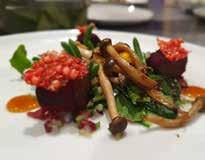
What do you think is the most challenging ingredient to work with?
Everything is challenging to cook with at first. I know that a lot of people struggle with a duck breast (hint: start with a cold pan).
What is your ‘death row’ meal, as Anthony Bourdain put it?
Beef prime rib, medium rare, mushrooms, proper mash, mushroom sauce, and a giant jug of beer.

When Covid-19 made its unwelcome entrance into South Africa earlier this year, it effectively stopped all meaningful physical interaction on every level. The events industry and, in particular, exhibitions have been among the hardest hit and now, almost nine months later, we are still reeling from the effects in our personal and business lives. Business worth millions of rand was lost, and many individuals lost their jobs with companies forced to close.
The PCO Alliance Network continued to stay present, keep updated and educated on new ways of doing business via virtual platforms and to keep the lines of communication open between themselves, their clients and their suppliers.
These difficult and unlikely circumstances, however, united the eventing and exhibition councils, associations and networks that saw the SA Events Council (SAEC) formed. It has 14 affiliate associations, of which the PCO Alliance Network is one. It was time for collaboration and the pooling of resources; this has also allowed for realigning and regulating our industry.
The SAEC collectively started campaigning to government to open up the industry in a safe and responsible way. The Event Safety Council (ESC) Re-Opening Guidelines were formulated in accordance with the health and safety protocols from the Department of
Health, the World Health Organization and other international event organisations.
On 22 July, SAACI – in partnership with the SAEC and the ESC – hosted its Proof of Concept Conference connecting various venues around the country to showcase the comprehensive risk assessment, safety checks and logistical planning that will be part of events moving forward.
On 1 September, the PCO Alliance Network –in partnership with the SAEC, Event Safety Alliance and five venues around the country – successfully undertook their own Proof of Concept Conference to demonstrate to corporates and local business that the events sector was ready to reopen in South Africa. The venues that generously sponsored these events were the Focus Rooms, The Capital Hotel Group and Cape Town International Convention Centre. They all adopted the SA Events Council Safety Guidelines protocol. This was a hybrid conference with live-streaming and physical delegates. Clients were invited to experience safety protocols first-hand and to observe the two platforms.
Late November also brought us the Restart Expo – an opportunity for the exhibitions industry to demonstrate what the future of exhibitions will look like.
As an industry, we stand united, as never before, and we are ready to take the business events space to new heights!
These difficult and unlikely circumstances, however, united the eventing and exhibition councils, associations and networks that saw the SA Events Council formed.”
Is 2020 a year to be forgotten or to be remembered? If you were to ask my children, the answer would be clear: Why would you want to remember a year where we could not hang out with friends, play sport or visit your grandparents? But for event professionals, this should be the year to remember as the one in which we were offered the opportunity to reinvent ourselves.
Many venues and event organisers were already experimenting with digital, for different reasons, including increasing reach, establishing a better understanding of customer behaviour, creating additional channels, etc. But almost all of us were still in the experimental phase, trying things out in order to fully understand the ins and outs. We then had to push the fast-forward button, with no time to think about all the possible issues and solutions.
A lot has been learnt over the past year. Most of us will agree that the world as we knew it before Covid-19 will not return as is. As one example: bringing people together from across the globe for a four-hour general assembly, including a 90-minute lunch break, is unlikely to happen. At the same time, the fact that we have not been able to meet face-to-face has made us realise the tremendous value of something often taken for granted. Although technology has helped to keep the global economy afloat, it cannot deliver the level of interaction needed for true innovation, collaboration and trade. People and businesses are required to meet to discuss, plan and create.
Event venues are – now, more than ever – the perfect platforms to do so. Not only do they have solid safety and security protocols in place, they now also offer the possibility to choose the channel

most suited to achieve the objectives of the event organiser. Take the example of a medical association. Typically, their annual congress wants to achieve objectives such as disseminating knowledge and stimulating innovation. The latter is done by bringing people together to discuss and network. The dissemination, however, does not necessarily require a physical presence and in some cases, those who are most in need are the ones who are not able to travel for financial or other reasons. Therefore, there is a clear need to use the digital services of the venues to reach these audiences.
Is everything in place to ensure organised events can take place again? Technically, yes. The first challenge lies elsewhere: how to win back the hearts and the confidence of international communities to come together again. The need is clearly there, but reluctance to get on that plane remains, even with various vaccines now on the horizon.
Venues and destinations will need to work together to conquer this by creating safe and smart value chains. Technology used to create safe environments – e.g. low touch – can also be used to create smart environments, creating value for delegates, organisers and venues. No more badges, metro tickets, or queuing at check-in –just one safe, seamless, touchless, end-toend experience.

This brings us to the second big challenge: the creation of quality standards for the next normal. The rollercoaster ride the industry has experienced needs to translate into a set of standards that provides event organisers with a sense of comfort – across the entire value chain – in selecting event venues and destinations.
The future is ours to create.
The year has been challenging for anybody involved in organised events but, says Sven Bossu , at the same time, the Covid-19 crisis has catapulted us 10 to 15 years ahead.SVEN BOSSU is the CEO of AIPC. Scripting our collective futures
According to author Nassim Nicholas Taleb, Black Swans are unexpected, hard-to-predict events that result in extreme, unintended consequences.
Enter the novel coronavirus.
Leaders from the industry could never have been prepared for what 2020 had in store for them – not only have their leadership skills been put to the test, but their ability to show resilience, as well as remain optimistic and relevant has been paramount to future-proofing this sector.
In July 2020, AAXO launched the Agile Leadership interview series, in which our chairperson, Projeni Pather, hosted open and frank discussions with the heads of a number of industry businesses, all of whom shared the impact that the pandemic has had on them personally and professionally.


These phenomenal lessons can certainly be deemed as Green Swans (positive market developments having a profound positive impact across economic, social and environmental value creation). A glimpse into the key and most common insights shared were:
1. Lead with honesty, empathy clarity and simplicity.
2. Individually and collectively, we can create an inclusive and transformed landscape.
3. Finding the opportunities in a challenging time is extremely rewarding.
4. A crisis calls for hard choices to be made. Ensure these are hyperclear to you and your team and have a laser focus on key priorities.

5. Creating a culture of recognition and appreciation of all team efforts goes a long way.
6. Believe in and care for your team, customers and projects.
7. Don’t underestimate the power of positivity to get you through a crisis.
8. Get into the hearts and minds of your clients to establish the ‘new normal’.
9. It’s never too late to set and/or change goals.
10. Be flexible and build confidence. Be sure to watch out for the many Green Swans that will be hatched over the next year, driven by our remarkable group of industry leaders who are guiding this sector into its ‘next normal’.
By now, many are familiar with the Re-Opening Guidelines that aim to limit exposure to Covid-19. Released in June this year, the guidelines were always intended to be a living document, with new versions coming out as the pandemic, and our response, progressed. One such improvement in the pipeline is the addition of critical sustainability considerations, which the Event Greening Forum (EGF) has been working on in partnership with the ESC.
While sustainability was originally factored into the recommendations, there wasn’t sufficient time to do this thoroughly. The focus was (rightly so) on helping the sector reopen as quickly and safely as possible. Now that we have had some time and have been able to assess some of the impacts of current practices, we are in a much better position to address important sustainability issues in the second version of the Guidelines
For example, the surge in the use of disposable plastic items and packaging is a growing concern. The
International Solid Waste Association estimates that this specific waste stream has increased by 250-300% compared to before the pandemic. We are trading one problem for another without considering that single-use plastic packaging is not necessarily safer than other options.
Version 2 of the Re-Opening Guidelines will be a useful and reliable guide for all businesses in an event’s supply chain to ensure that their events meet best practice standards not only in terms of health and safety, but also sustainability.
The EGF hosted a #BuildBackBetter Master Class on 18Novembertooutlinesustainableeventpracticesthat canbeimplementedinlinewiththe Re-Opening Guidelines Tofindoutmore,gotowww.eventgreening.co.za or contactPippaNaudeon+27(0)743696369or pippa@eventgreening.co.za.

The speed at which the Covid-19 pandemic has impacted and ravaged the exhibitions and events sector is beyond imagination, but there is a silver lining, says Devi Paulsen
Industry collaboration is driving the development of best practice standards that address all critical aspects of event management for our ‘new normal’ – including sustainability, says Greg McManusGREG MCMANUS is chairman of the Event Greening Forum.

The development of new skills to keep our professional attributes and knowledge up to date is a discussion that SAACI, as an association, has regularly.


Upon reflecting on our conversations with colleagues, the consensus is that we all operate in a fluid environment and the need to upskill on aspects such as the latest regulations, event safety guidelines and planning documents are core to any event you may be working on.
In addition, many venues within hotels must comply with their overall group or internally developed safety guidelines – in our discussions with many members, to better understand how their venues are operating, we have found that it is important to read and have conversations to ensure a better understanding of the regulations.
Members have also indicated that they have reviewed past events to take note of elements and touchpoints that would have had to be modified in accordance with Covid-19 safety guidelines. Our aim is to have pre- not
post-mortems! For any planned business event, the intention is to identify and create solutions for each potential pain point so that, when the time comes, the delivery of a Covid-19-safe and socially distanced event is second nature.
While it appears that virtual events are here to stay, at least in the interim, whether they include an in-person component or not, we all need to have some basic familiarity with new technology and platforms – and how to troubleshoot is essential for event professionals. Understanding what’s possible and having some familiarity with the biggest virtual platforms out there will ensure that knowing basic troubleshooting for the inevitable technical difficulties will rule out most challenges. Needs and values have shifted from just a few months ago and soft skills that have become more relevant are patience and empathy. It’s so important to take the time to get to know your audience again, show them that you care; speak with empathy, humility and compassion, and, remember, our industry is built on relationships.
We have finally reached the end of 2020 – a year we thought would be so different to what we experienced. Even though it was one of the most difficult years we have ever faced, 2020 showed us what is most important. For me personally, I am encouraged by how many of us have taken a step back from the hustle-and-bustle of our day-to-day lives to realise what we need to truly value: our connection with those we love and care for, our homes, health and happiness.
2020 was still 20-plenty. It was a year that showed us just how much we have to be grateful for and one during which we saw that if we stand together, anything is possible. Travelbags has adopted this ethos, and even though we have had the toughest year ever in our existence, we came together as a committee and as an industry to reach out with helping hands to those who needed it most.
Travelbags has survived this year because of its committee, and the input and support of its members. We will not only
continue to survive going forward but will thrive going into 2021.
We are excited about how we have managed to adapt to our situation and bring so much to those who attend our events. It is my and the Travelbags committee’s mission to encourage, support and bring joy to the travel and hospitality industries and to all who are part of them. We were still able to raise funds for our chosen charities this year and support members who were in need and reached out to us – all thanks to our member network and sponsors. That is the purpose of Travelbags; we bring people together to network, we raise funds for charity, and we support our members who are in need.
From us at Travelbags, we wish you all happy holidays and a prosperous 2021! During this time, remember to keep encouraging each other and be kind to everyone you meet.
The business events sector has experienced a series of changes during 2020, with the impacts of Covid-19 being key drivers of change to our skill set as professionals, says Glenton de Kock .
In the wake of the challenges we have all faced this year, it is also an important time for us to reflect on what we have achieved, says Michelle Hinrichsen .
Given how rapidly the landscape has changed during the course of this year, past trends were clearly just that, and have now either fizzled out or been put on hold while we make way for the ‘new normal’.
What this has demonstrated is that global events such as the novel coronavirus pandemic can easily cast a shadow of doubt over what we thought we knew. More than this, it has spotlighted the need to take stock of the resources we have and seek out alignments and collaborations to strengthen our efforts in meeting our business objectives and targets. For many, this means ensuring their businesses survive long enough to see them through the pandemic. And hopefully things will all go back to how they once were.
While Covid-19 is pushing us to think out of the box about how we work and the avenues we are using to identify opportunities, is it enough?
In short, no.
We need to take note of just how turbulent and murky the waters are that we are endeavouring to navigate and, unfortunately, it isn’t all plain sailing. Some courses may land us back at square one, while others could put us streaks ahead of all our competitors and give us a real edge.
Without the complexities of operating in an environment that is currently in a state of flux, it is much easier to create growth. During times of crisis, however, decision-makers are

far more discerning when it comes to how much they spend and on what products and services. With our work cut out for us on how we deliver exceptional value and generate the ROI so key for our stakeholders, now, more than ever, we need to keep abreast of all the possible aspects of ever-shifting goalposts that could potentially affect us.
During the hard lockdown, regulations meant that any and all gatherings were off the cards – even brief visits with family. As the rate of Covid-19 infections eased, we could host gatherings with a maximum of 50 people and at Level 1, we can now host a maximum of 250 indoors and 500 outdoors, or 50% of a venue’s max pax. These developments are key to how the events industry functions but without reading the headlines and following the news, it would be impossible to understand how this was relevant to us.
In 2021, we will need to delve deeper than ever before to ensure we are able to adapt to even incremental shifts. It may be trial and error to find the right solution but those who dare will win.
If we can take anything away from 2020, and do so with absolute certainty, it’s that nothing is cast in stone.
subs@3smedia.co.za theplanner.guru































theplanner.guru is a one-stop platform for finding venues and suppliers. It’s where you can read the hottest industry tips and trends as well as source event planning tools and gain insight from valuable information in the MICE Hub. Plan your event by using the platform’s event boards and keep up-to-date with the daily newsletters. Use these resources to take your events from great to flawless.
Packed with advice, handy tips, tools, checklists and event planning insight from leading industry experts and combined with the comprehensive listings, The Meetings & Event Planner is essential if you’re organising any type of event. Published annually.

























The Incentive Planner is jam-packed with fresh ideas and top tips to turn any incentive trip into a memorable experience. Out in March and September with Meetings.
The Exhibition Planner is an essential tool for exhibitors. Information is packaged in an easily digestible format addressing the entire process of planning and arranging a show stand, what to do pre-show, during and post-show. Published annually.
This alternative monthly publication investigates new trends, ideas and strategies relevant to the meetings and events industry to keep you ahead of the planner pack. Meetings provides a platform for branding and promoting venues and service providers to the heart of the South African conferencing and event industries.
3S Media gives YOU the competitive edge as a MICE planner



